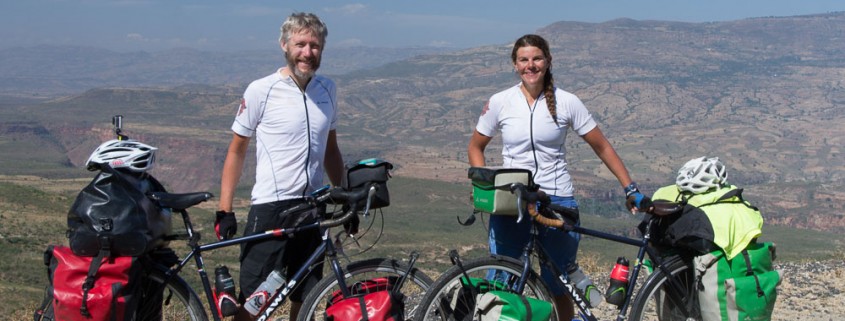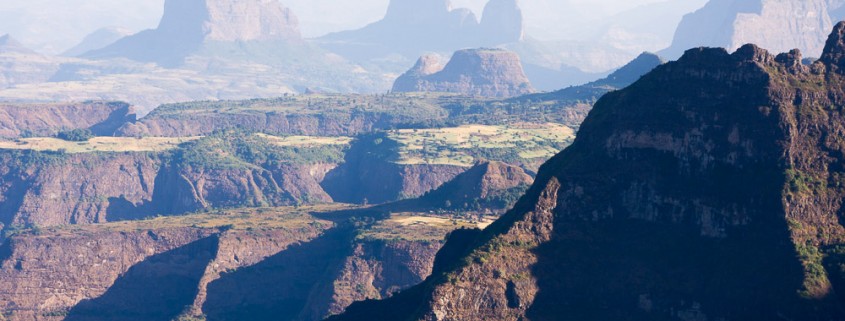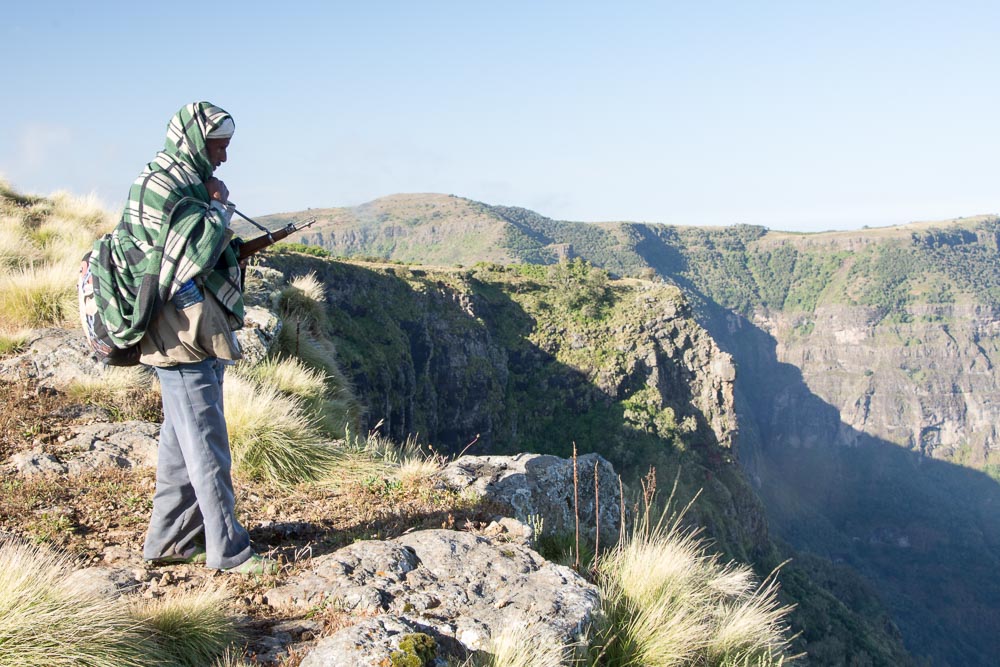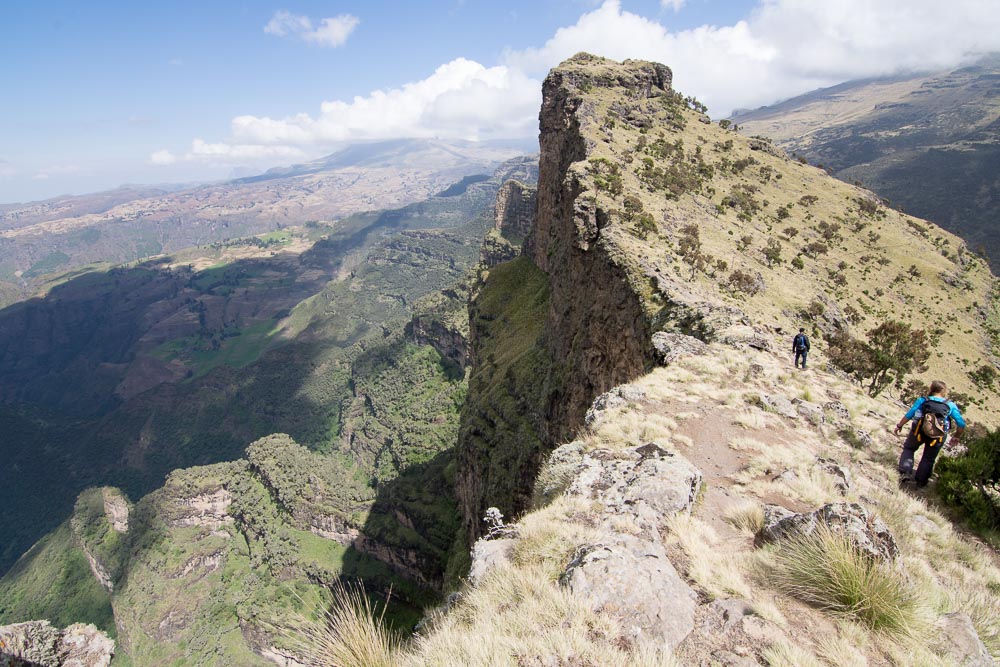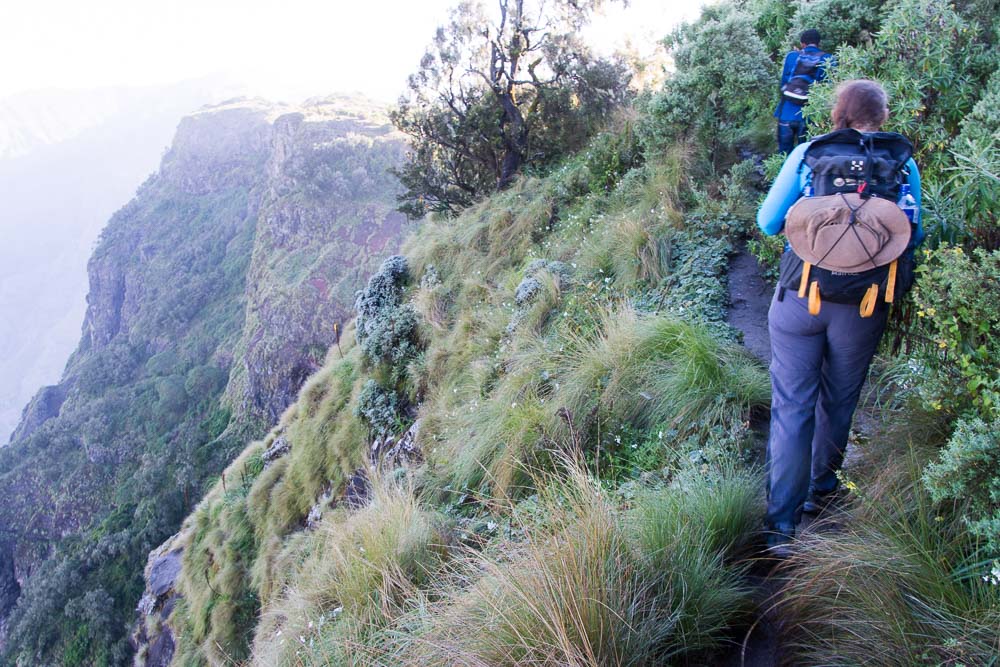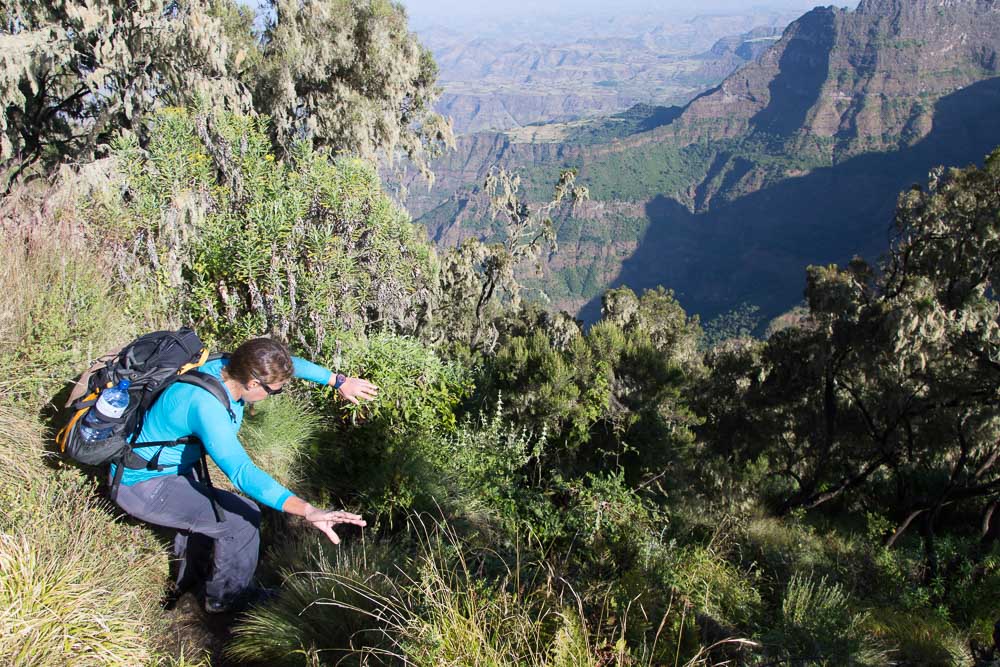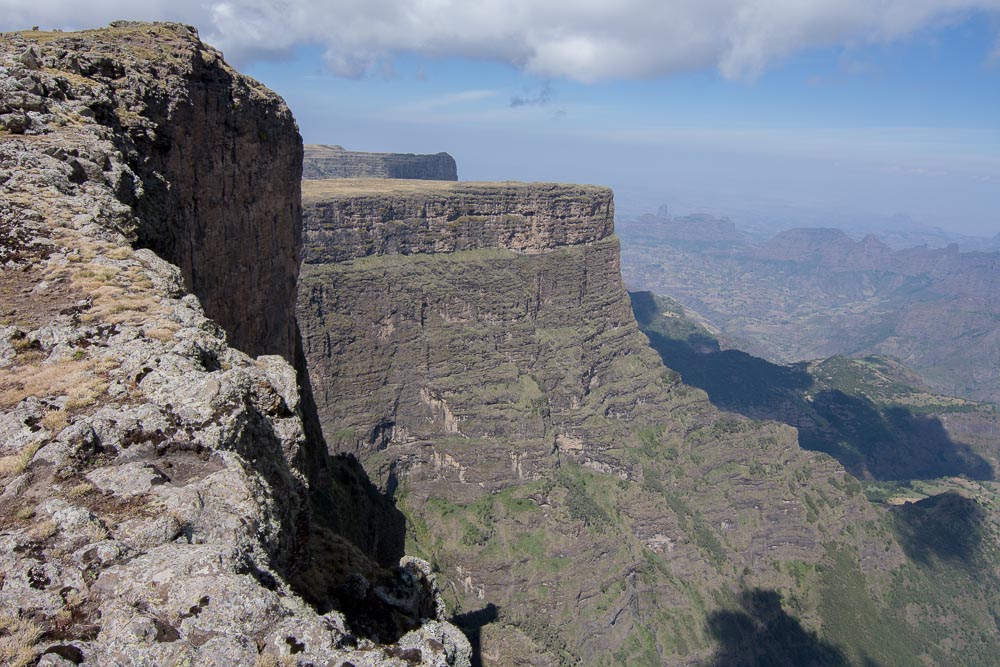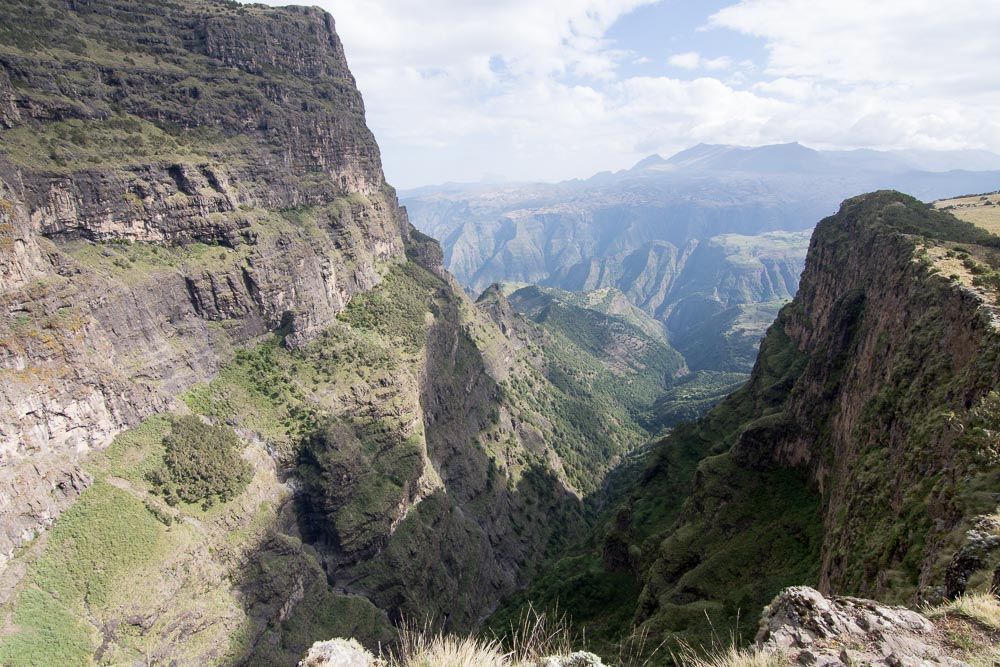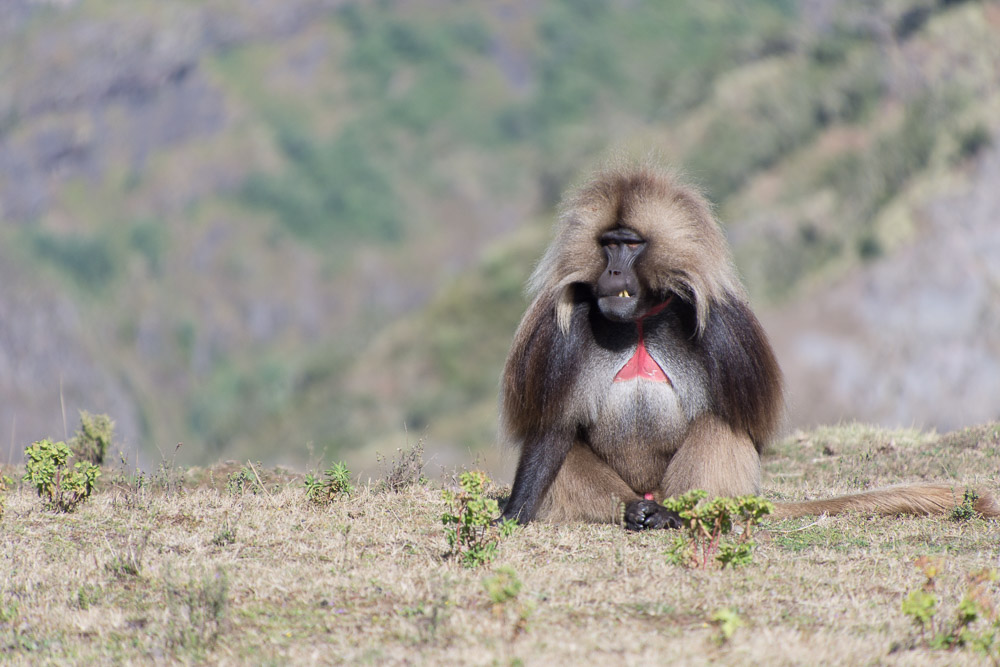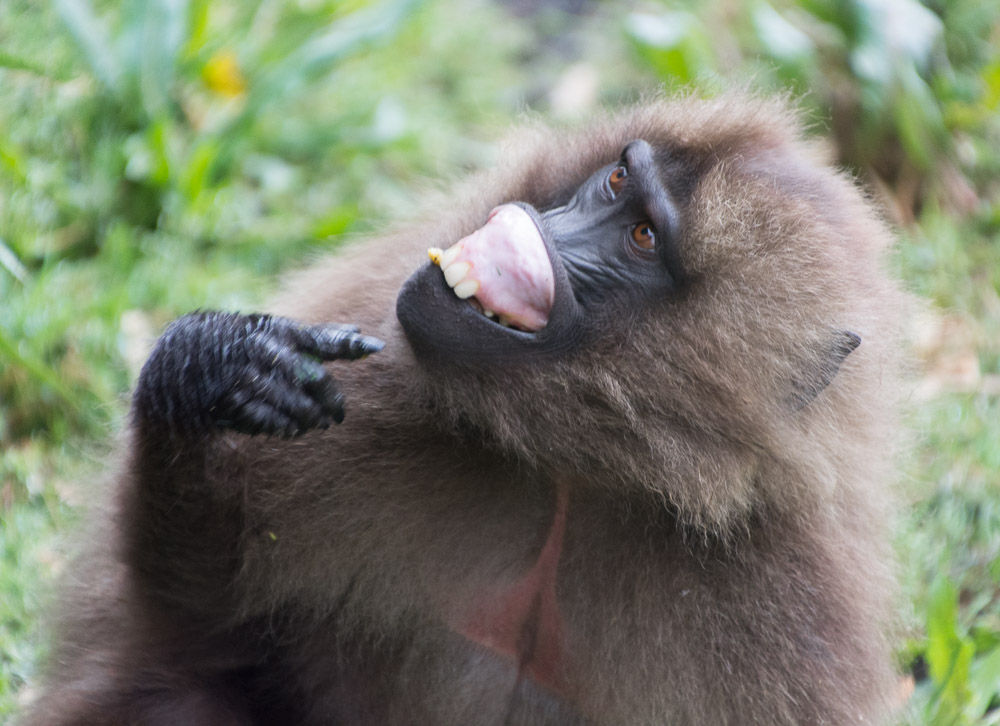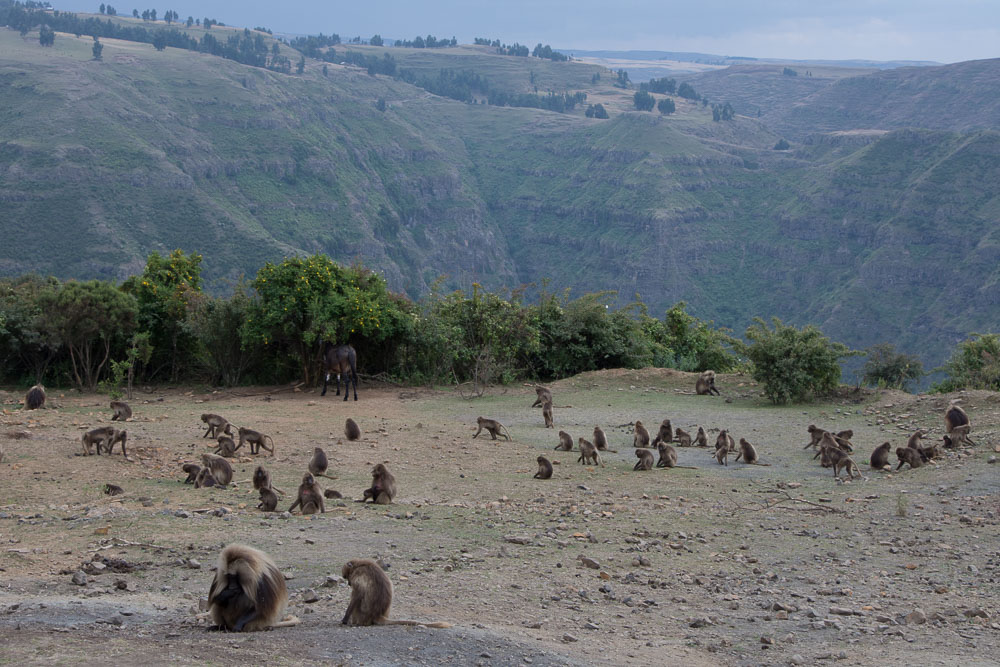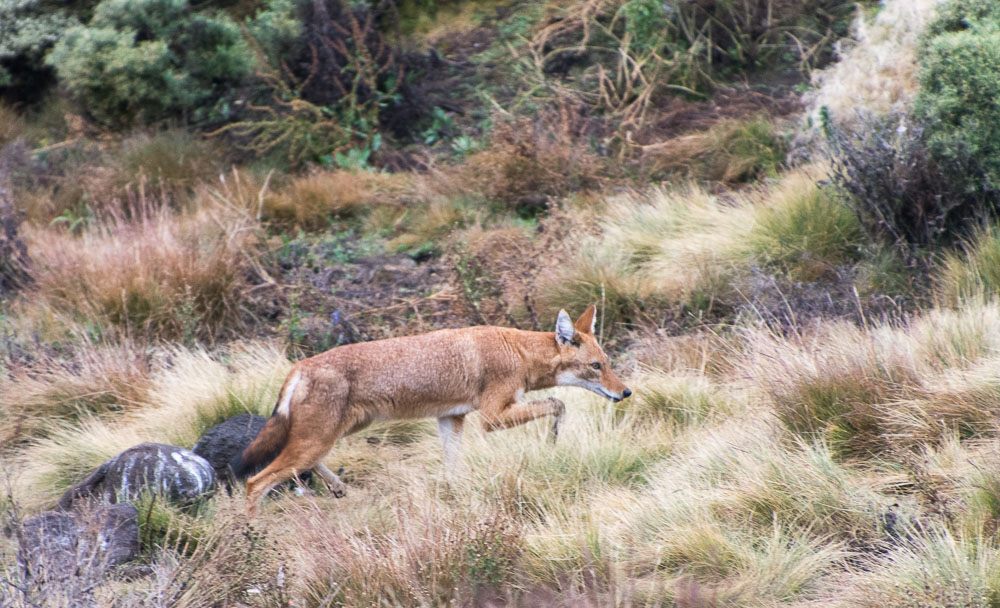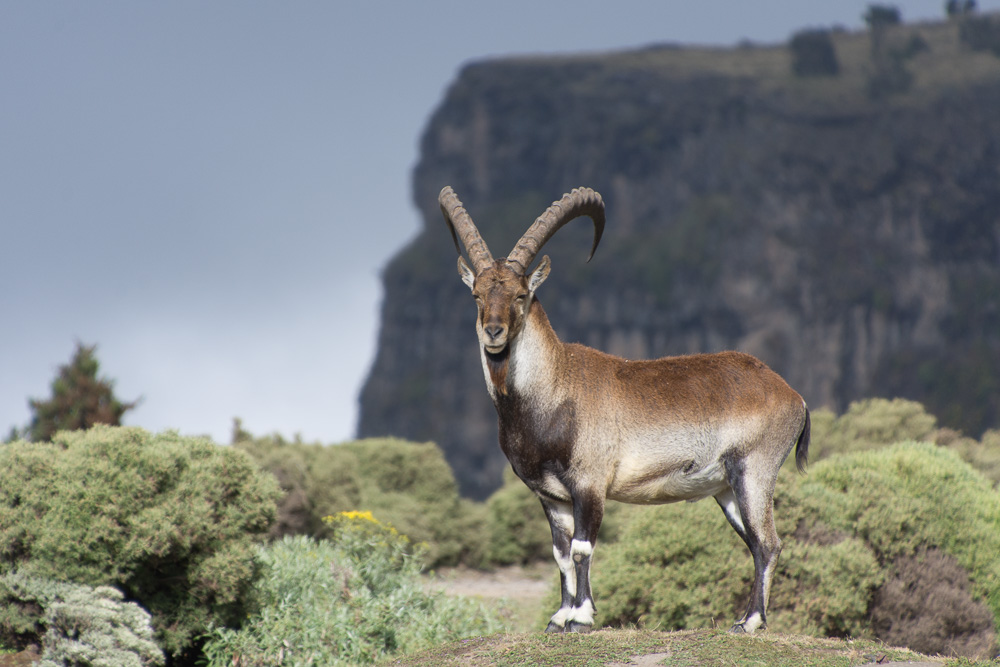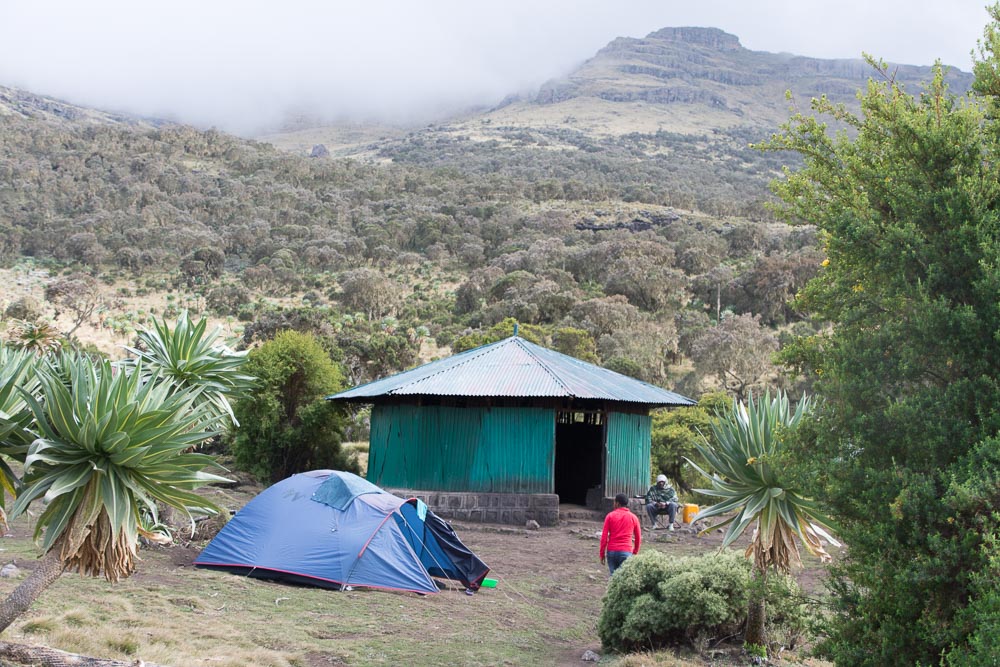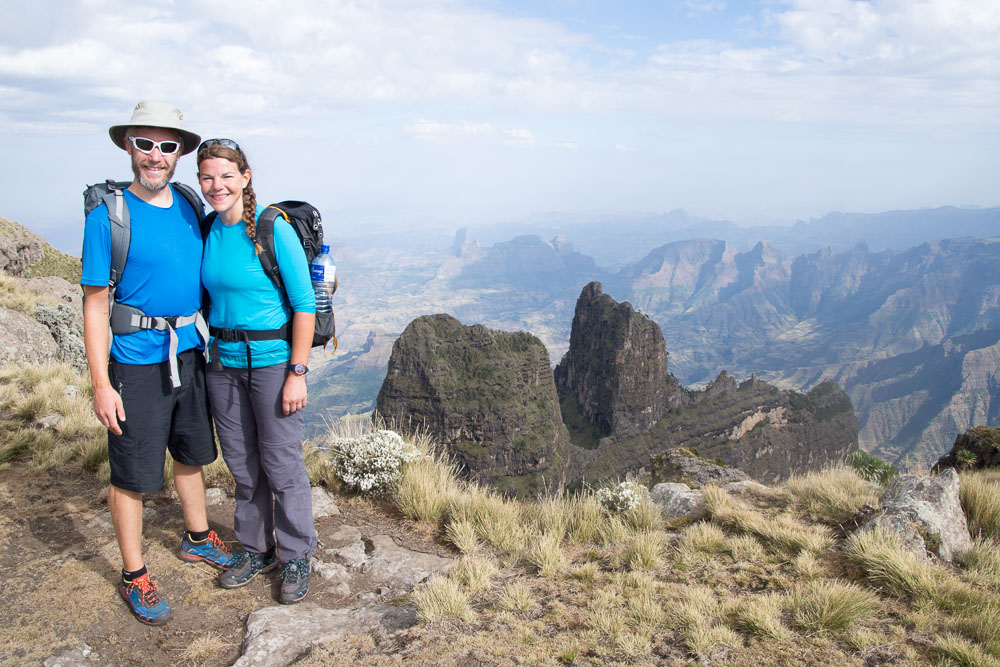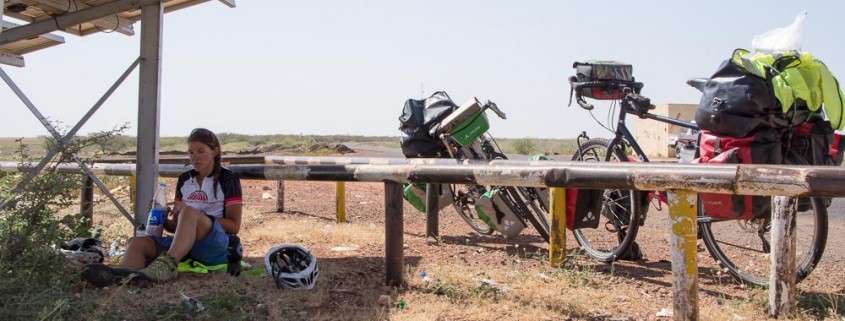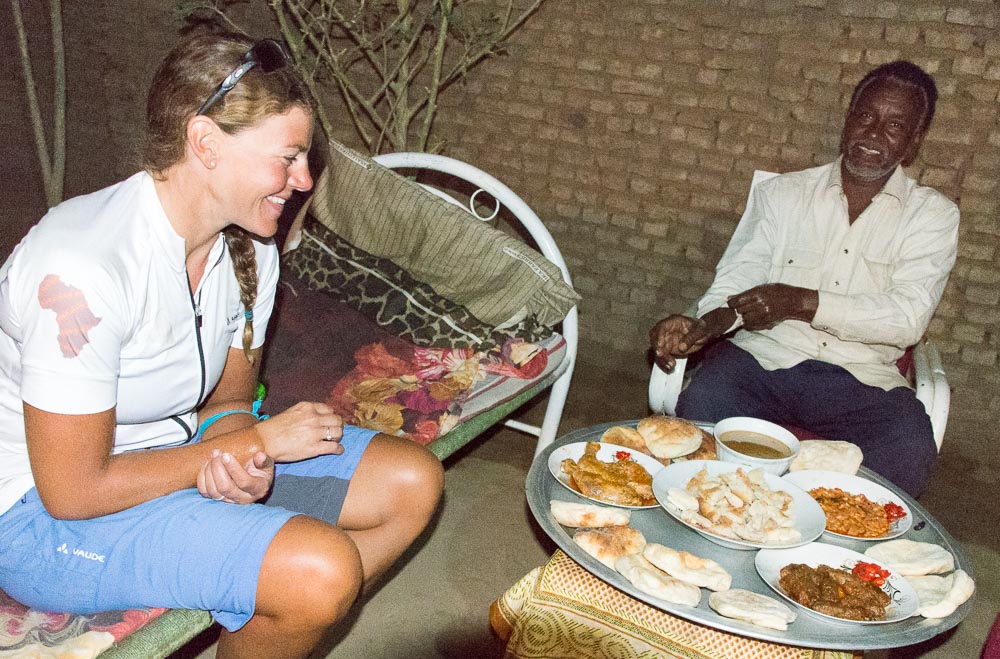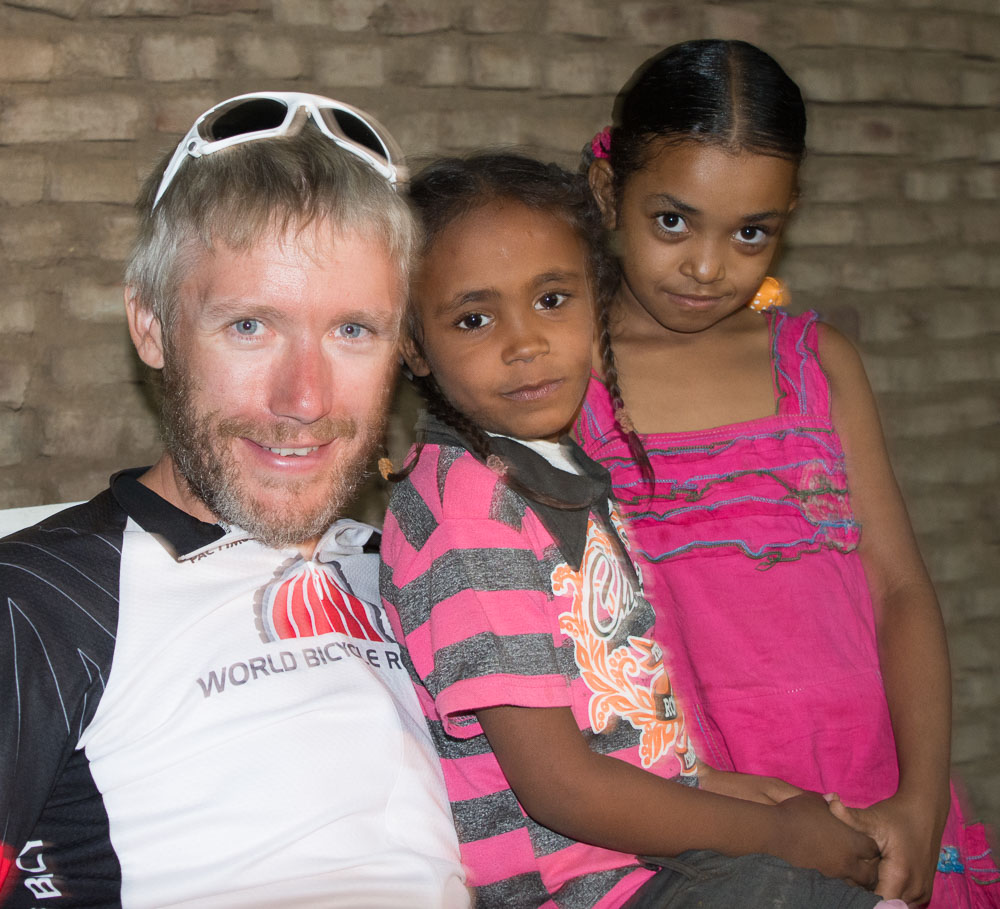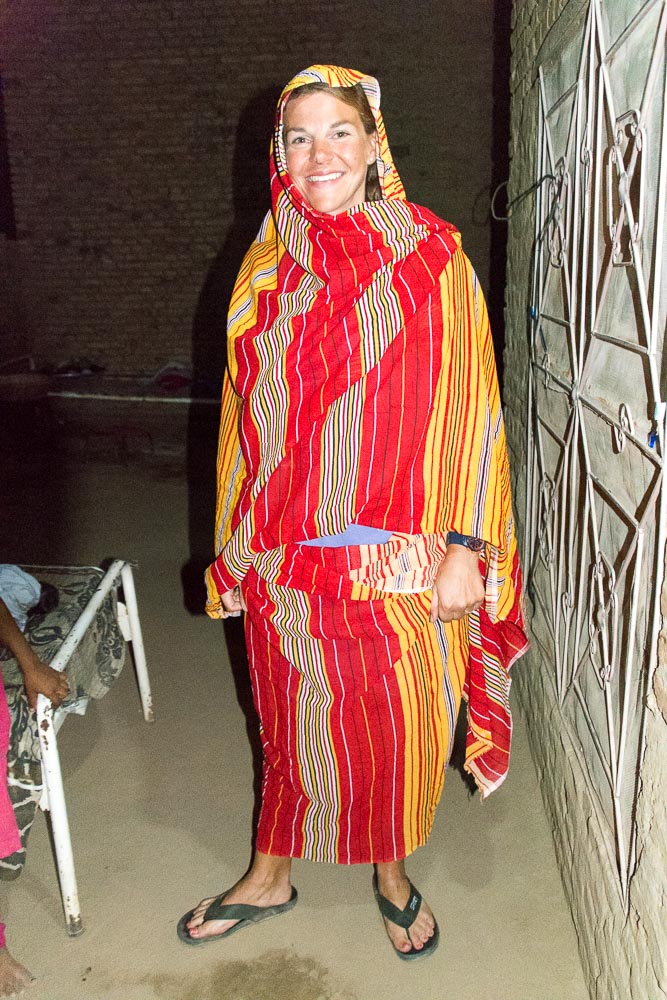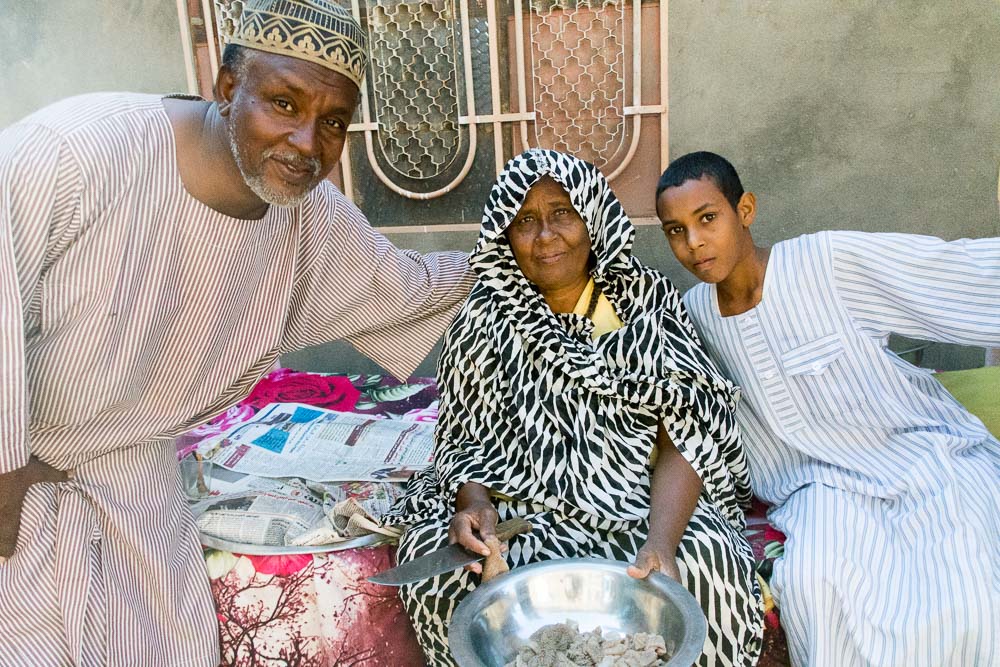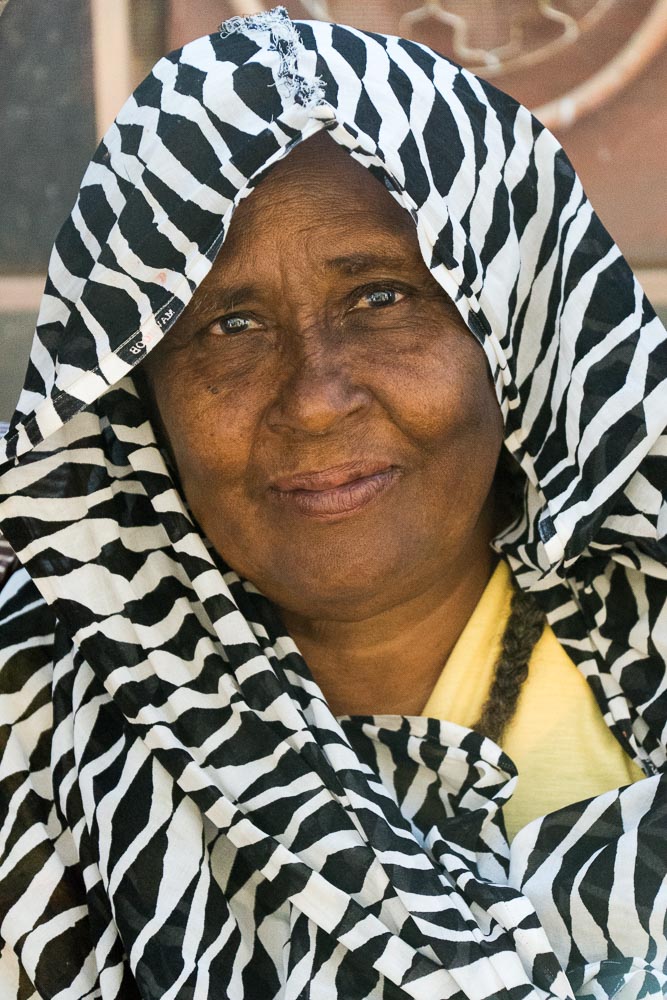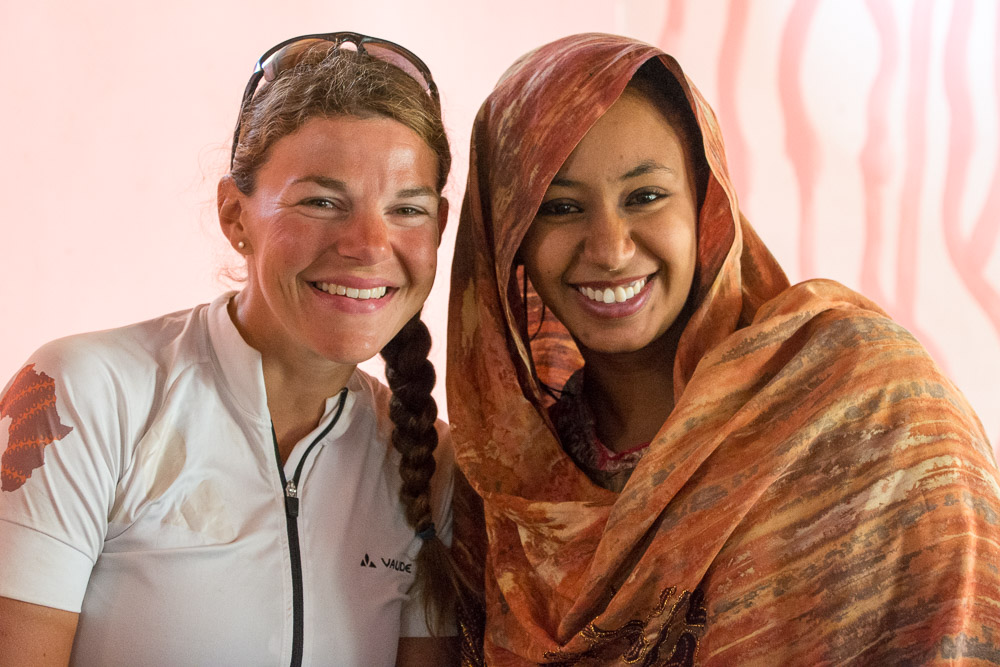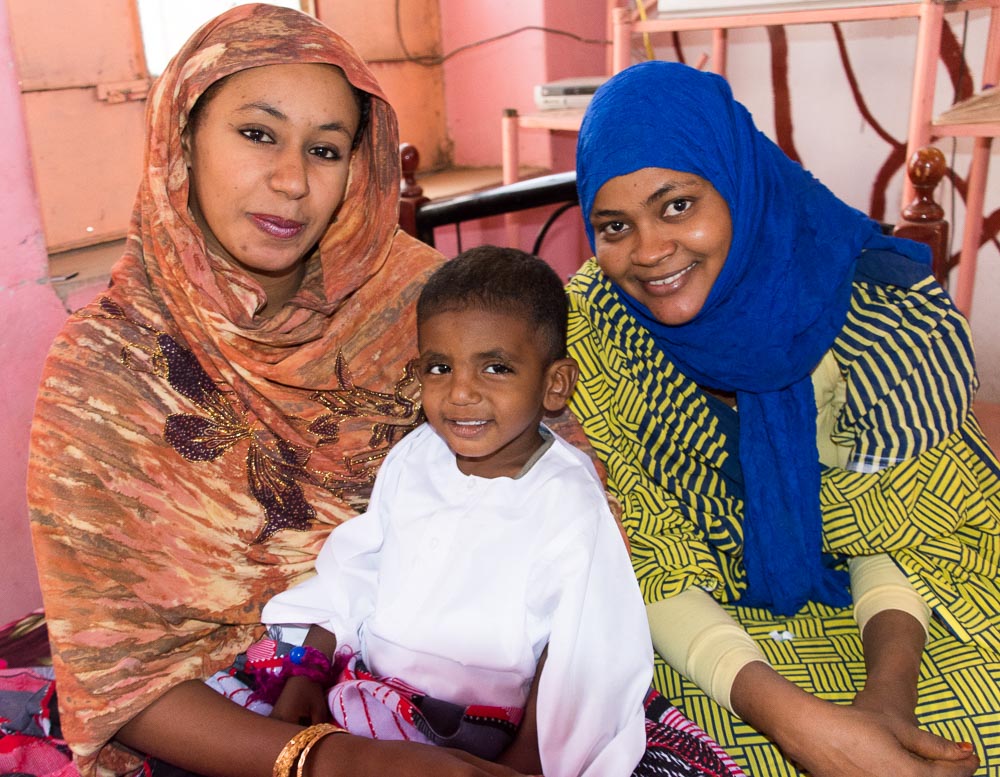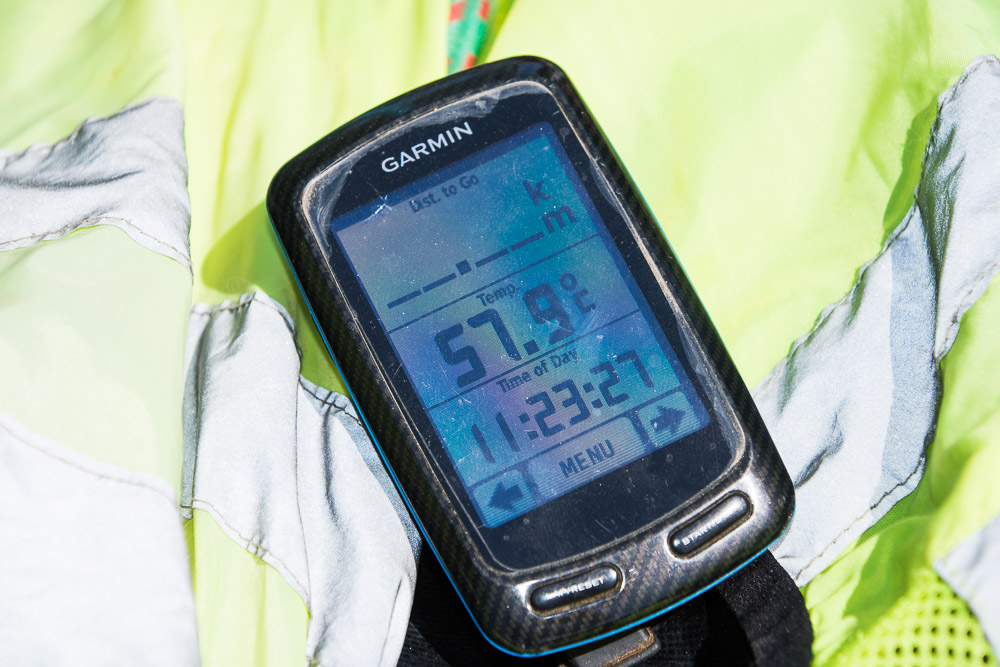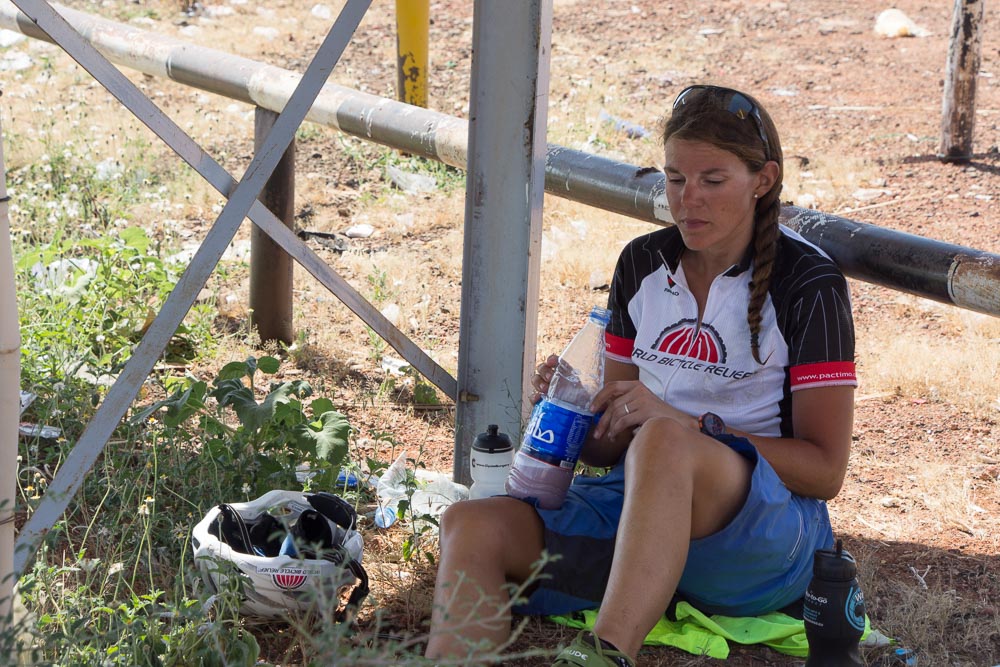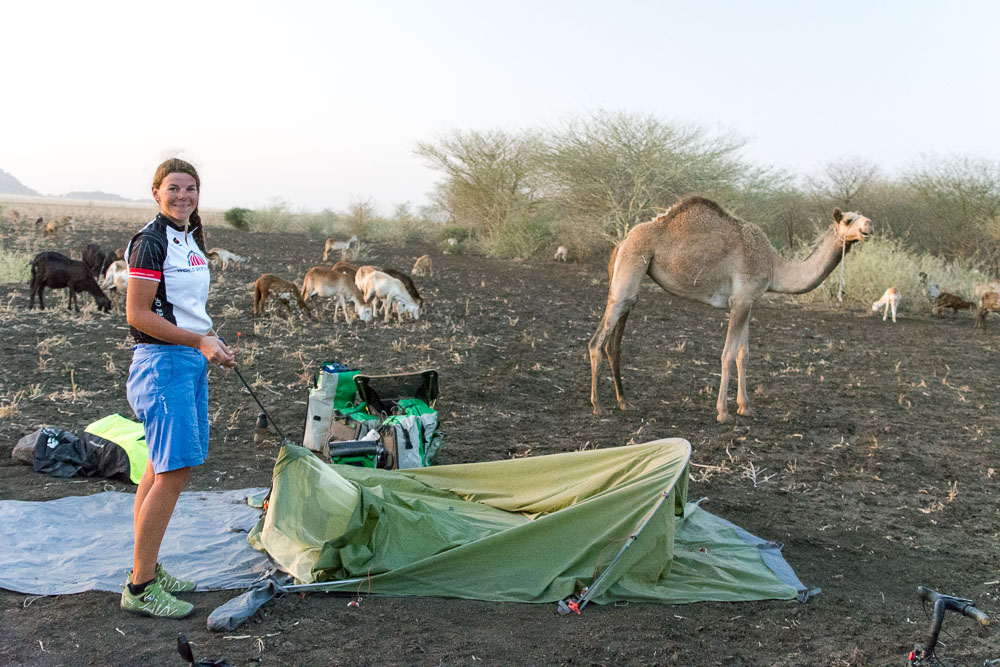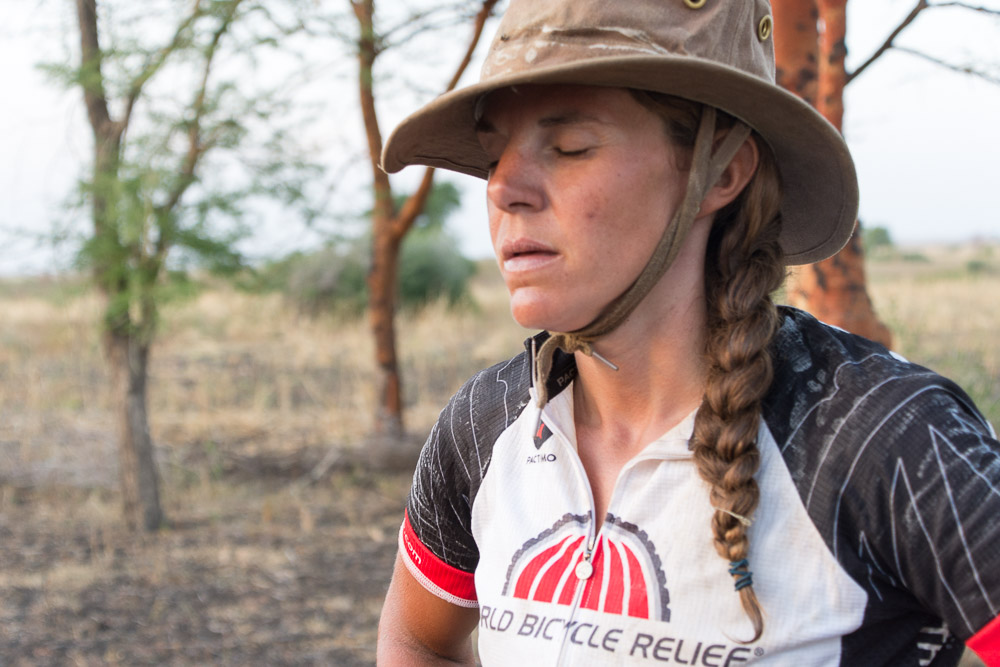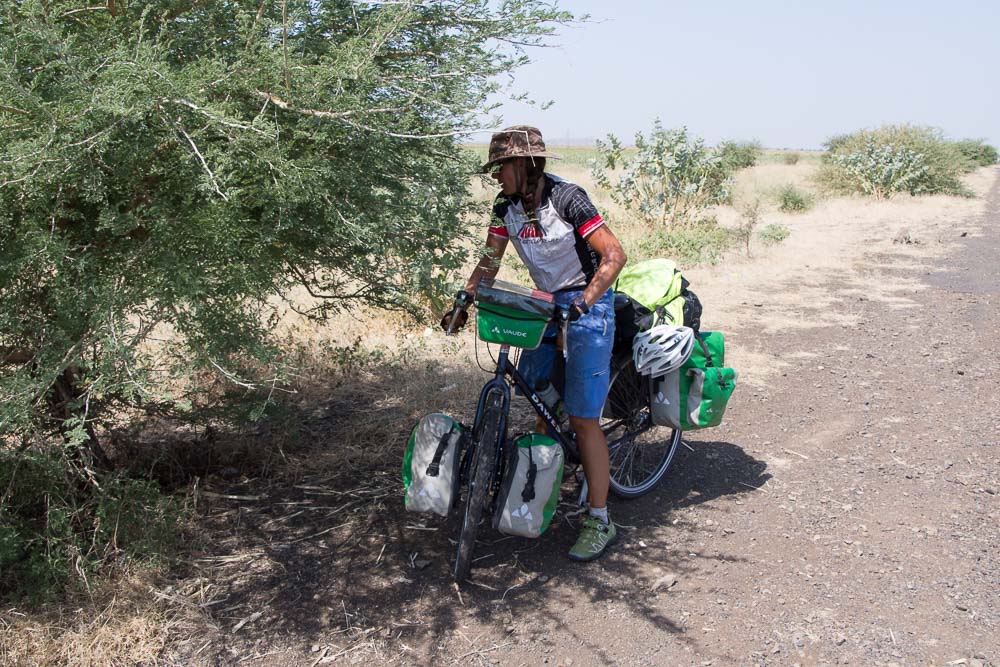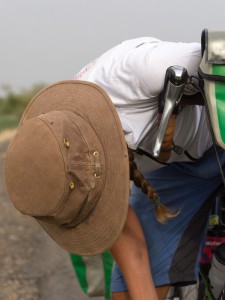Up high: Getting stoned in the Ethiopian Highlands
It was possibly not the wisest choice for two tourists who were about to cycle in Ethiopia for the first time to watch an episode of “The World’s Most Dangerous Roads” the night before we set off. In the episode in question, British comedians High Dennis and David Baddiel drive their sturdy 4×4 the length of Ethiopia and warn of the dangers of poor road conditions and unskilled driving made worse by long distance drivers that are high on khat (pronounced ‘chat’), a leafy plant, which acts as a stimulant when chewed. Together with the mountains we had to climb and warnings of stone-throwing kids, we left Gondar with a sense of trepidation.
It didn’t take long for the warning bells to ring true.
Within minutes of mounting our bikes, each and every man, woman and child shouted at us in some way.
Men would shout “you!” Women would shout “money!” and kids would shout “You, You, You! Money! Money! Money! You You You You You You! Give! Pen! Pen, Pen, Pen”. And so on.
A slight variant was the shout of “Where you go?” A grammatically-incorrect phrase which, after hearing thousands of times a day, becomes irritating. I tried to correcting a few people by telling them “No, it’s where are you go-ING”
But it was the children that were the worse.
Ethiopia has once of the fastest-growing and youngest populations in the world. In fact, 44% of the population is aged 15 and under. And it appeared that every one of those 41 million kids came out to ‘greet’ us as we cycled the 730km from Gondar to Addis Ababa.
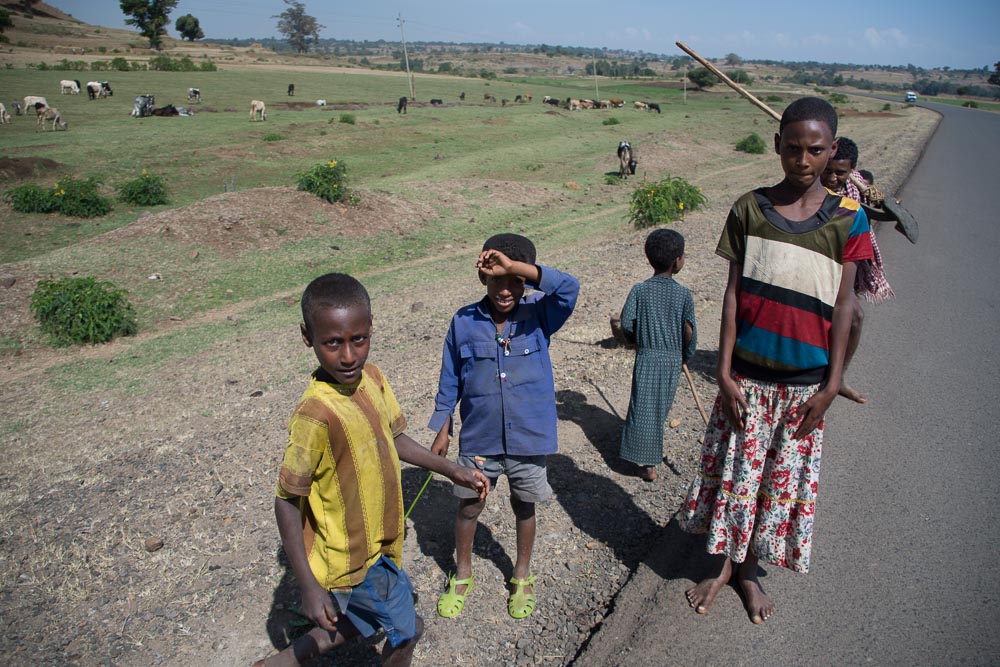
One of the smaller bands of ‘supporters’
Kids by the side of the road would shout at us. Once they’d spotted us, the children who were further away would run hundreds of meters across fields to reach us as we passed in the hope that we’d respond to their shouts of “You! You! You! Money! Money! Money!”
It didn’t take long before the first rock was thrown.
We’d passed a particularly pesky group of children who’d run alongside us for a few hundred meters. When they gave up the chase, rocks were hurled in our direction. Emily got one square in the back.
These kids, although small, would make great cricketers. Stick one on the square leg boundary and they’d have the arm to hit the top of leg stump 9 times out of 10.
They’re great little runners too. Whole swarms of kids would run alongside us shouting “Money, Money, Money!” or “Pen, Pen, Pen!” as we attempted to negotiate the notorious Ethiopian highlands. At times, particularly tenacious kids would follow us all the way up a hill (our heavy bikes often limit us to 5kph up hills) so they could often keep up; this regularly tested our patience immensely.
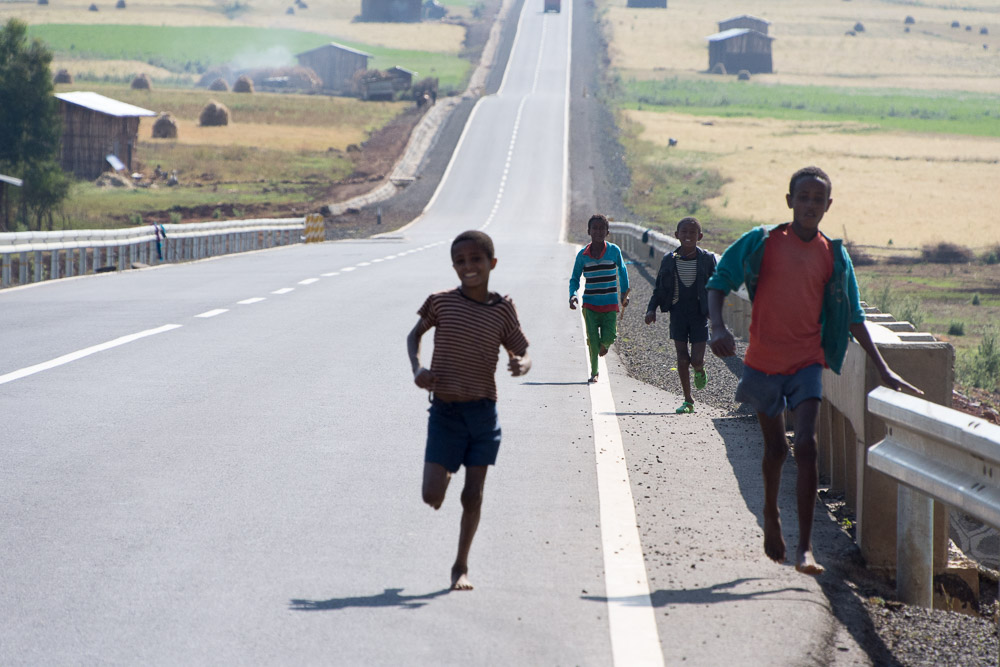
Kids would run for miles for the opportunity to shout at us
We learnt over time that the best tactic was to smile and greet the kids as we approached and then simply repeat everything they said back to them. It didn’t stop the shouts, but it flummoxed them a little. The best way to avoid the rocks being flung was to turn and face the kids as we cycled by until we were out of reach. Which, with their throwing arms, meant cycling whilst looking backwards for a considerable distance!
The shouty and stone-throwing kids are only really a problem in the rural areas. Here, they’re given a few animals to look after when they’re 6 years old and that’s their life. No school. No prospects other than small-scale farming.
In the bigger towns where kids have been able to get an education (albeit in an education system where some schools are so overcrowded that kids have to attend school in alternating shifts) the people are a little more welcoming.
Education is key. That’s why the shouts of “Money! Money! Money!” is so frustrating – and it’s why we’re proud to be supporting an organization, World Bicycle Relief, that exists to help educate kids in rural communities across Africa. Please support them too: donations are being doubled until 31st December 2015.
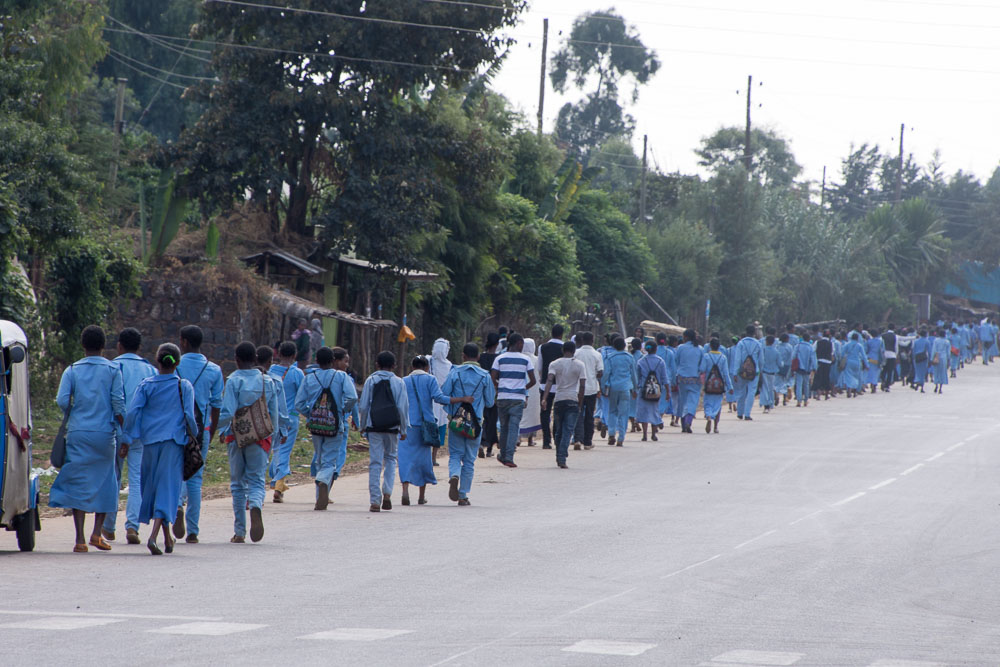
These kids are lucky to get an eduction. Although Ethiopian schools are so stretched that kids have to attend school in shifts.
Midway through one morning, a truck driver coming in the opposite direction saluted us as he passed. With his beer bottle.
Don’t come to Ethiopia if you crave solitude. Wherever you go and whatever you try to do, someone will pop up from the middle of nowhere. Literally, it’s insane. This makes loo stops particularly challenging. And it also makes camping difficult. In fact, as we discovered that you can stay in hotels for around £1.50 a head, we often opted to sleep indoors in Ethiopia to get a little privacy for a few hours.
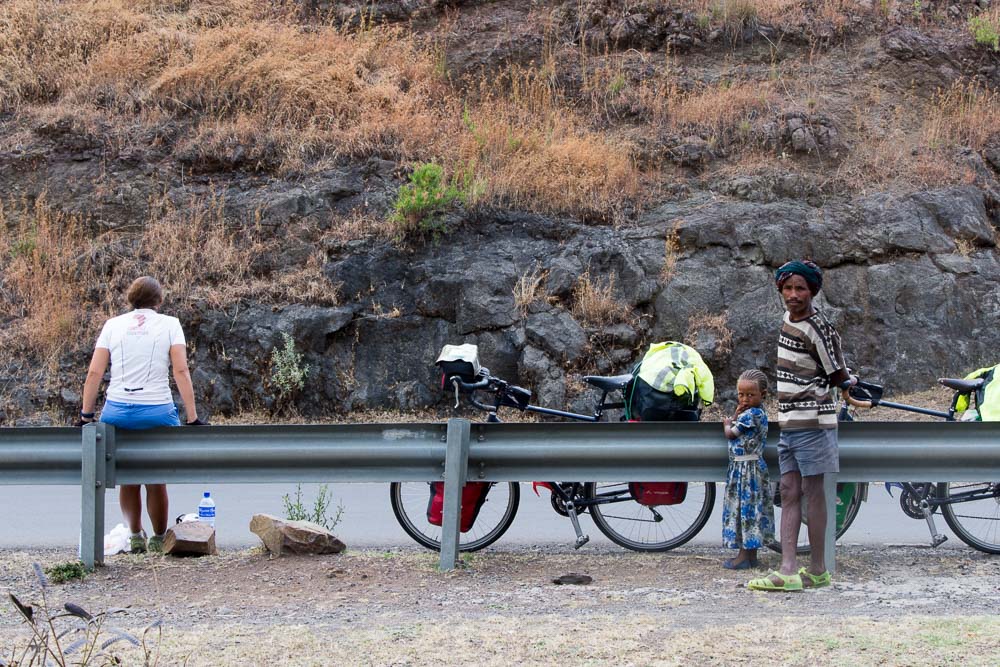
Even a roadside breather is an event
On our first night from Gondar we found a small patch of grass on a steep embankment just off the road and pitched our tent – all witnessed by a throng of kids at very close quarters.
We reached Lake Tana and checked into the Bahir Dar Hotel, a simple guesthouse where the small rooms were set around a quiet courtyard. There was free WiFi when the electricity was on but the whole town suffered regular power cuts – something that’s common across Ethiopia. It was only when we returned to the hotel after dinner when we sensed the atmosphere had changed somewhat and we realised that the oldest profession in the world was still going strong at this establishment. Still, for 100 birr (£3GBP) a night, it was easy for two weary cyclists to turn a blind eye and get a reasonable night’s sleep.
We hit the road early the next day. We’d just ventured past the city limits when a ladies cycling team took us by surprise as they whizzed by. Over the next 20km 3 further large groups of cyclists passed us on their training rides, each group giving us a wave as they achieved speeds we could only dream of.
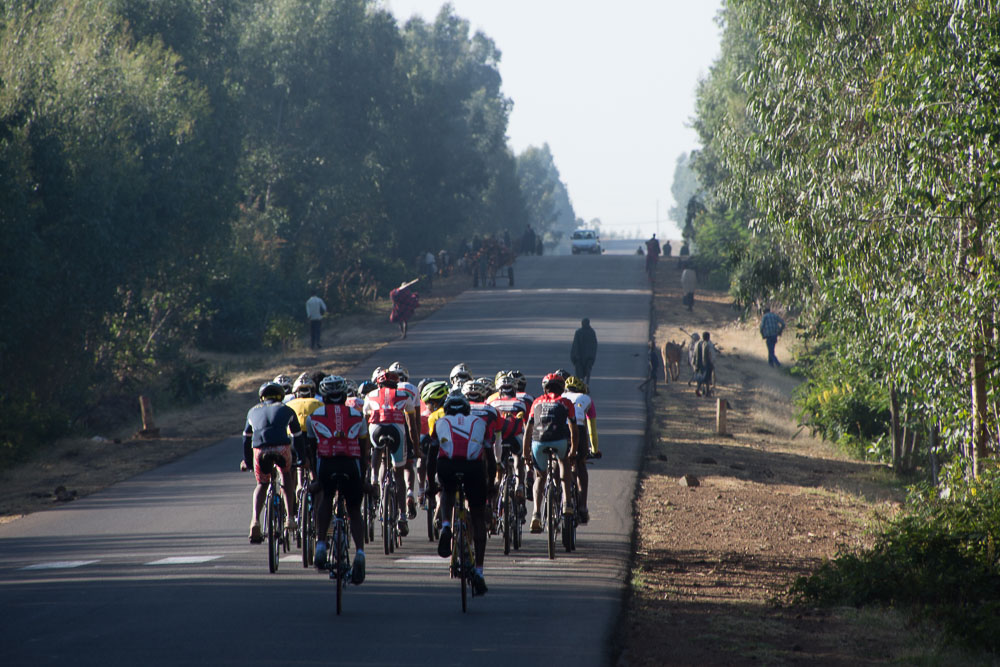
The Amhara Region Cycling Team whizz by
50km from Bahir Dar Emily’s back wheel started clicking so we stopped to take a look at a small village called Wetet Abay. We were helped at the roadside by a couple of lads who’d been cycling alongside practicing their English us but our arrival caused the whole village to come out, crowd round us and stare whilst we tinkered with the bike.
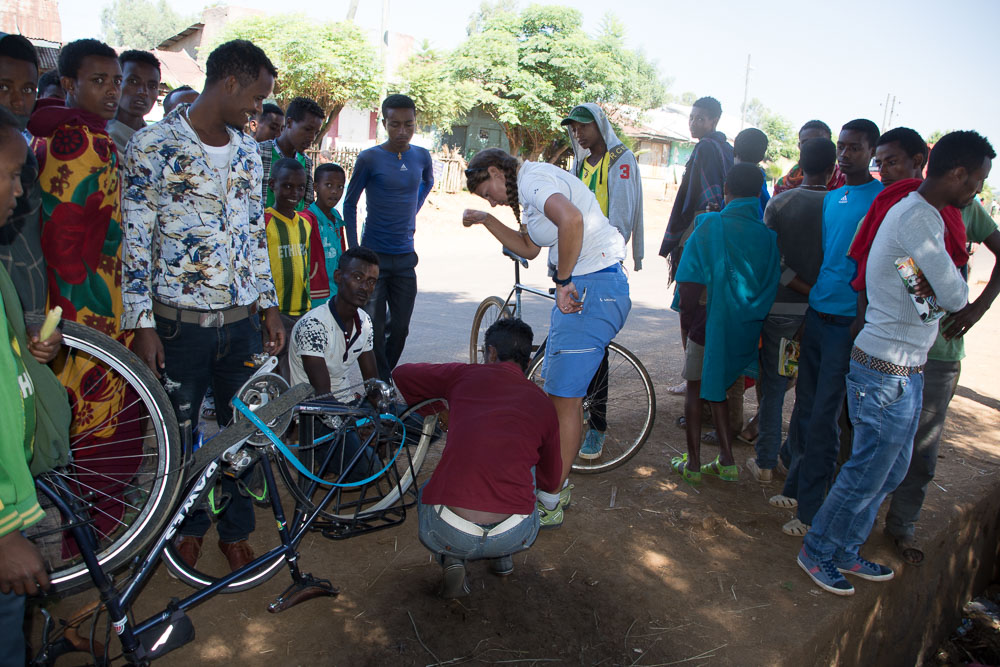
A broken spoke becomes the most exciting thing ever to happen in this village
On inspection, we found a spoke had broken. We thought it would be a simple job to replace but, frustratingly, we had to remove the rear cassette to do so. A job that required a special tool (a chain whip) that we didn’t have.
We were assured the larger village 10km up the road had a mechanic who could help so we flagged down a minibus, hauled our bikes onto the roof and made the short trip. There, the mechanic didn’t have a chain whip either and he started bashing the wheel and used a wrench to undo the rear hub. When he revealed the bearings, we called a halt and decided we wanted to put our trust in someone else who had a bit more knowledge and, ideally, the correct tools for the job. We decided to return to Bahir Dar.
On the minibus back we looked up the Bahir Dar-based cycling team and sent them a few messages to see if they could help us and, once back in the city, we checked back into our guesthouse-come-brothel for another night.
It was by sheer fluke that, later that day, we bumped into a member of the cycling team we’d seen on the road that morning. Molla agreed to meet us the next morning to help us.
At 12:30 Ethiopia time (06:30 foreigners’ time) we met Molla and he took us to the team headquarters of the Amhara region Cycling team. They have a small compound with dormitories, a communal dining area and dozens of battered bikes and parts that have been begged, borrowed and acquired from around the world.
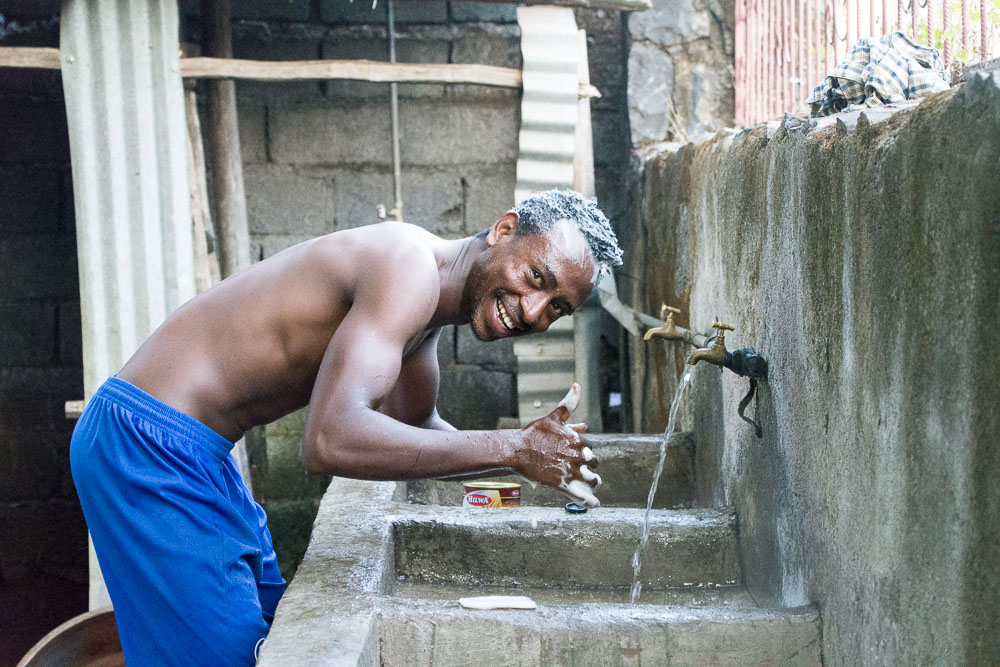
The Amhara Region Cycling Team’s base is a fun environment!
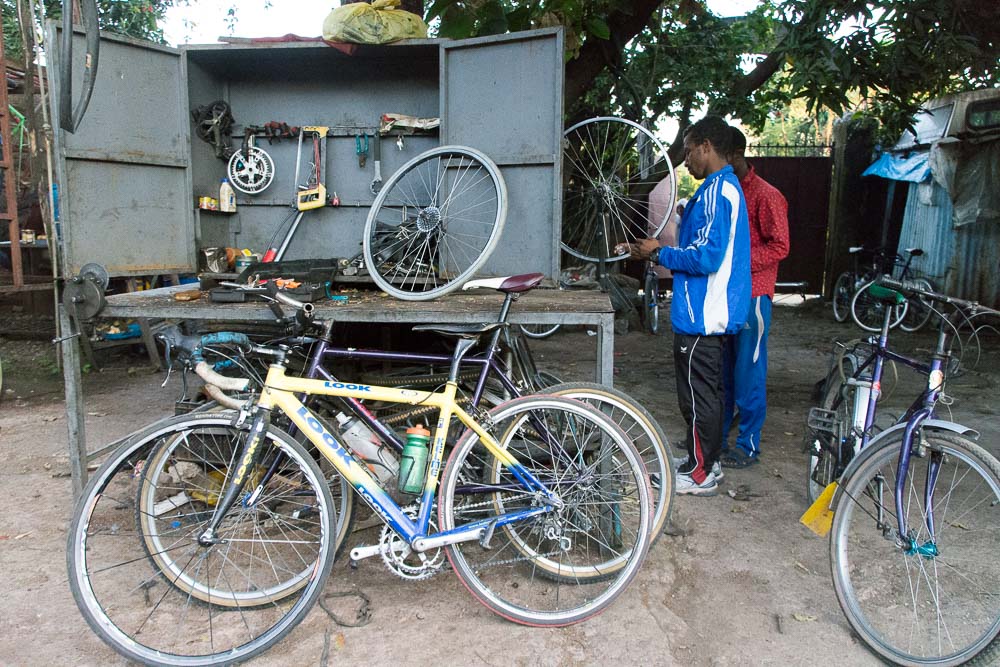
Amhara Region Cycling Team
Molla and his friends set about fixing Emily’s wheel. Not only did they have a chain whip but also they had a wheel-truing stand! Outside, the A-team mustered for a training ride whilst Molla stayed behind to tell us more about the team’s successes and ambitions over breakfast. These guys are incredibly dedicated cyclists but we were astonished by their lack of kit. One rider was using a bike with carbon frame that had snapped. He’d simply taped it up to get back on the road.
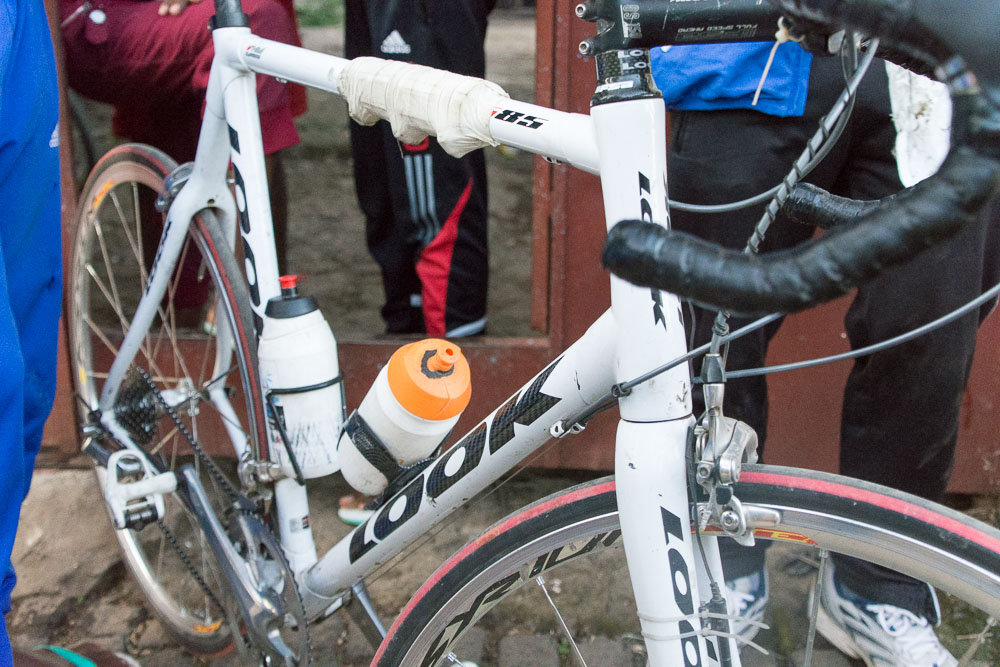
An old carbon frame is taped up to keep it going
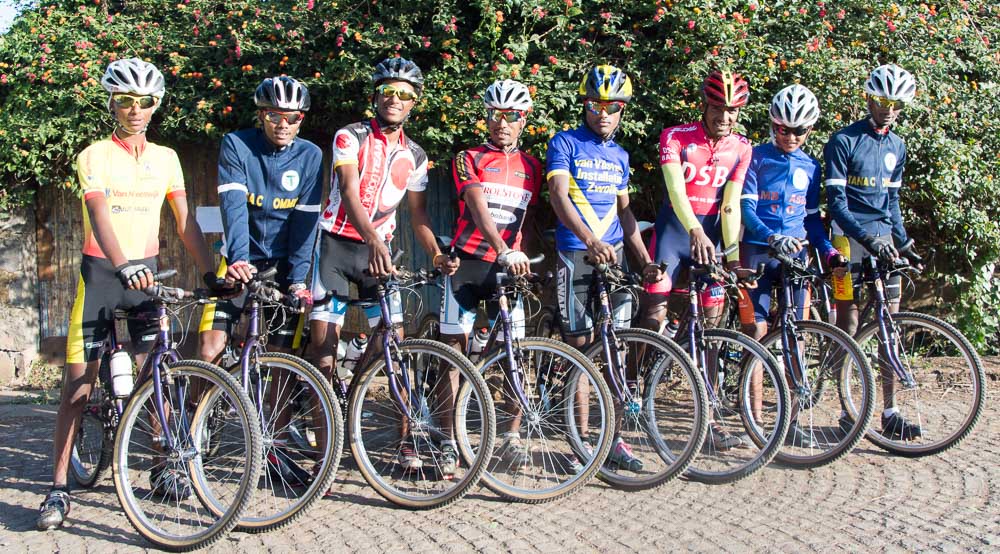
Some of the Amhara Regional Cycling Team prepare for a training ride
We said our goodbyes to Molla and found a minibus to take us back to where we’d stopped yesterday and continued our ride towards Addis, only half a day behind schedule, having promised to do what we could to encourage donations of used cycling kit (such as saddles, pedals, shoes and sunglasses) from friends and cycling clubs back in the UK to help them compete with other regional teams who have access to more.
Back on the road, we made it 170km from Bahir Dar when Emily’s spoke snapped again. A passing charity worker gave us the short 2km lift back up the hill in his pickup to the town of Finote Selam where the mechanic there didn’t have a chain whip either. There was no choice but to ask for Molla’s help again.
We locked our kit and bikes in a hotel room and took a minibus 170km back to Bahir Dar. By the time the driver had stopped countless times to make pick ups and drop offs the journey took 4 and a half hours.
A chain whip (or strap wrench) is a long, bulky and heavy tool and, prior to departure, we’d pondered long and hard as to whether we should take one with us. We reasoned that it was highly unlikely we’d need one so took the risk to omit it from our kit list. Something we now regretted.
We were grateful that Molla and the cycling team were able to fix the wheel again and, as we left, the joker of the team waved us goodbye saying “see you tomorrow!” We are looking forward to staying in touch with Molla and his team to follow their progress and will definitely do what we can to try and help them when we can.
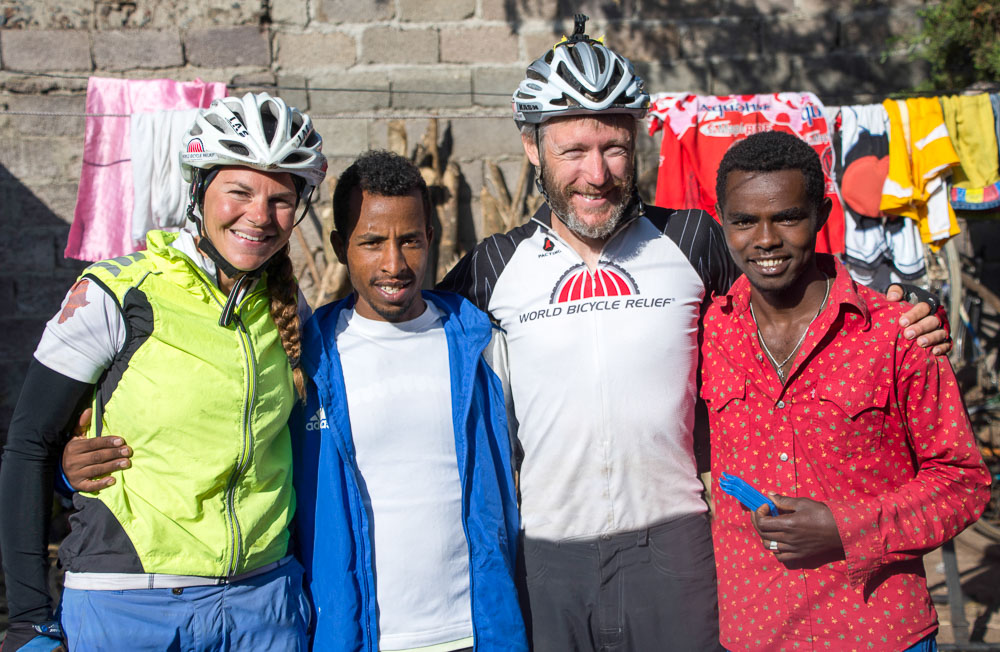
Thanks to Molla and friends at the Amhara Regional Cycling Team for getting us back on the road
By the time we left the cycling team it was now dark and no local minibuses were departing Bahir Dar. The only options were to check back into the Bahir Dar brothel or get a minibus bound for Addis Ababa to drop us off en route. Fearing for the security of our kit in the hotel, we paid over the odds for two seats to Addis. I made a point of getting up close to the driver to smell his breath for any signs of alcohol before we squeezed ourselves into the back seat of a Toyota HIACE minibus.
Not long after departure, the driver pulled over at a brightly lit shop and returned with a big bag of leaves. Khat. This is what we were dreading. Now in the middle of nowhere, we had no option but to hope the effects of the drug, which is a class-C drug in the UK, would only kick in after he’d dropped us off in 150km time.
We made it back to our hotel in one piece. Although it took some time to get the blood back into our legs after enduring the cramped conditions on the back seat.
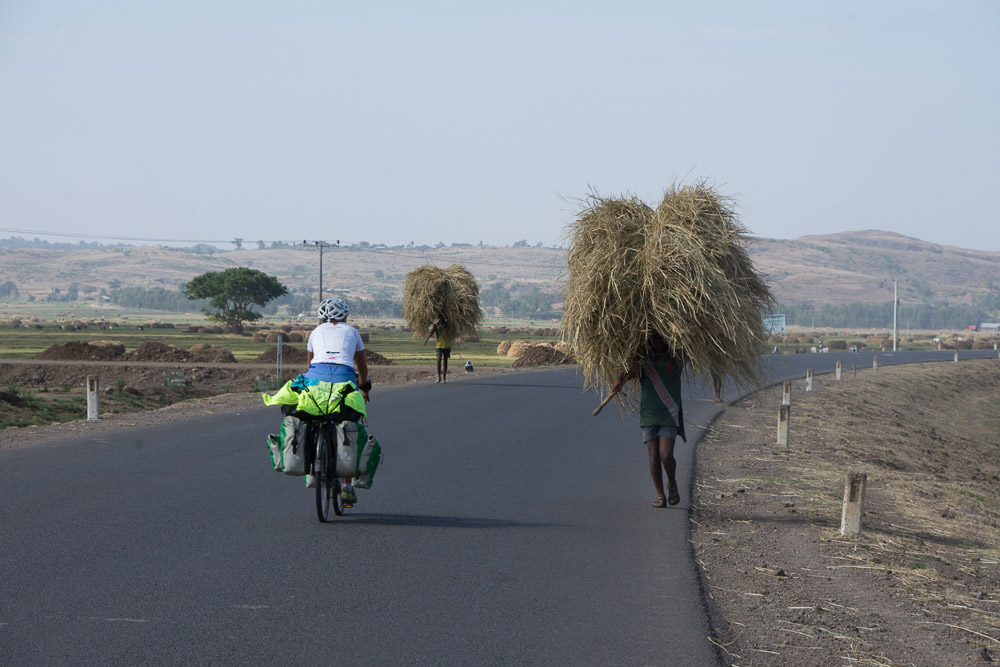
Most farm work is done by hand
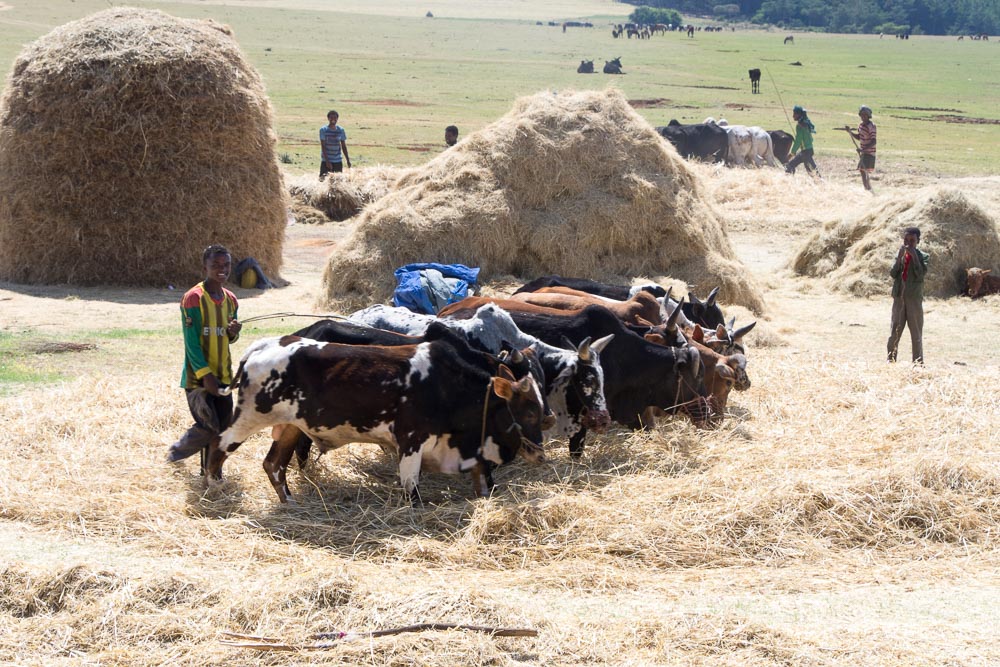
Cattle are used to tread the hay
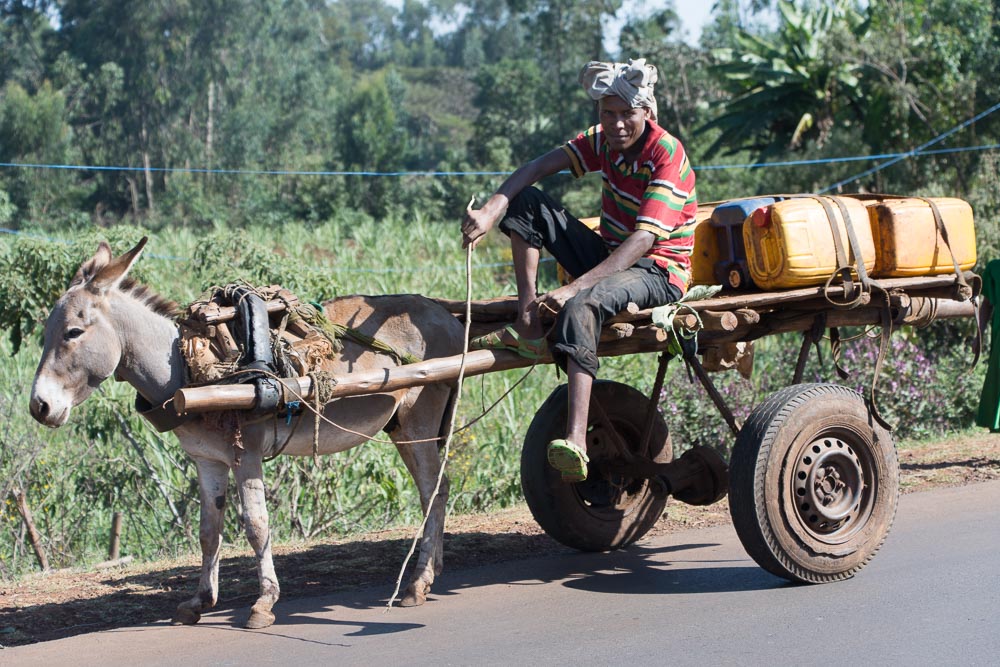
After a couple more days’ ride to the soundtrack of “You! You! You! Money! Money! Money!” we checked into a hotel in Dejen with the aim of getting a good night’s sleep before taking on one of the biggest climbs of the expedition, the Blue Nile Gorge, in the morning.
Our room appeared reasonable on first inspection but, for the life of us, we couldn’t work out how to turn the main light off. The switch in the room controlled the bathroom light. We fetched the manager. After a bit of investigation, we discovered the light in our room was controlled by the switch at the top of the stairs, which was round two corners of the corridor from our room, how logical. We had just drifted off to sleep when guests ascending the stairs illuminated our room as they tried to find their way to their room. I used our precious duct tape to hide the offending switch from further guests.
It’s not just the lights that have kept us awake. The hotels we’ve stayed at have had very bars, which have played very loud music well into the night. Also, Christian Orthodox prayers are broadcast across the town form loudspeakers. Bad luck if, like us, your hotel is close to one. Prayers on a Sunday morning start at 2am and go on through the early hours. The prayers in this video had been going on since 2am and were still going strong at 7am when Emily was racking her panniers.
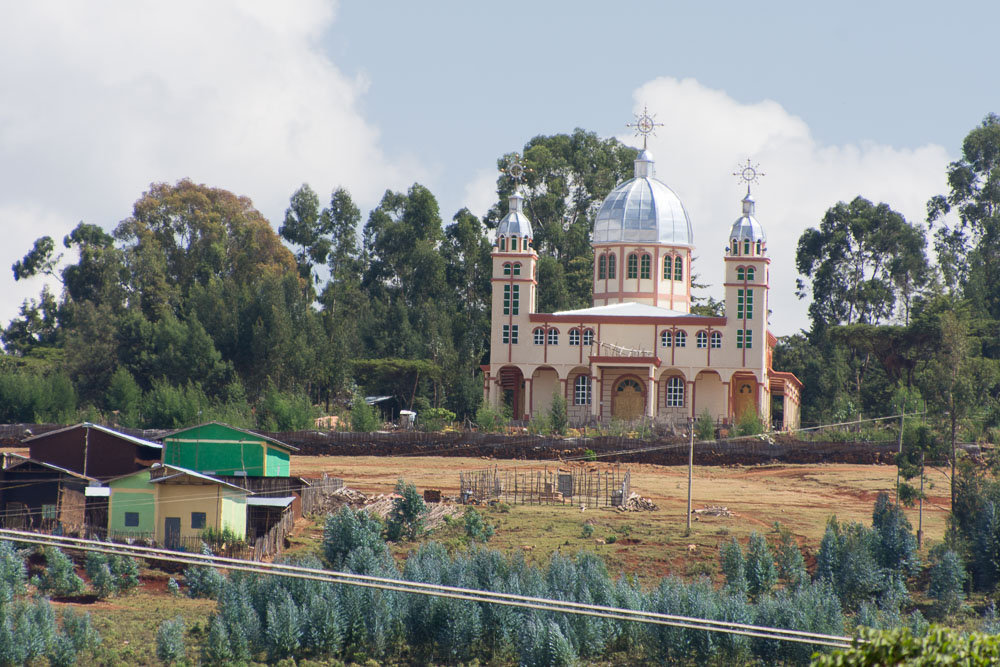
A Christian Orthodox church. The source of some very loud early Sunday morning prayers!
The sign at the top of the Blue Nile Gorge warned of rock falls and “sloppy” conditions. The descent itself was more suited to mountain bikes than fully laden touring bikes. The road surface was rutted and gave way to gravel in some parts as countless lorries had churned up the surface. Our disk brakes took a pounding for the 90-minute descent.
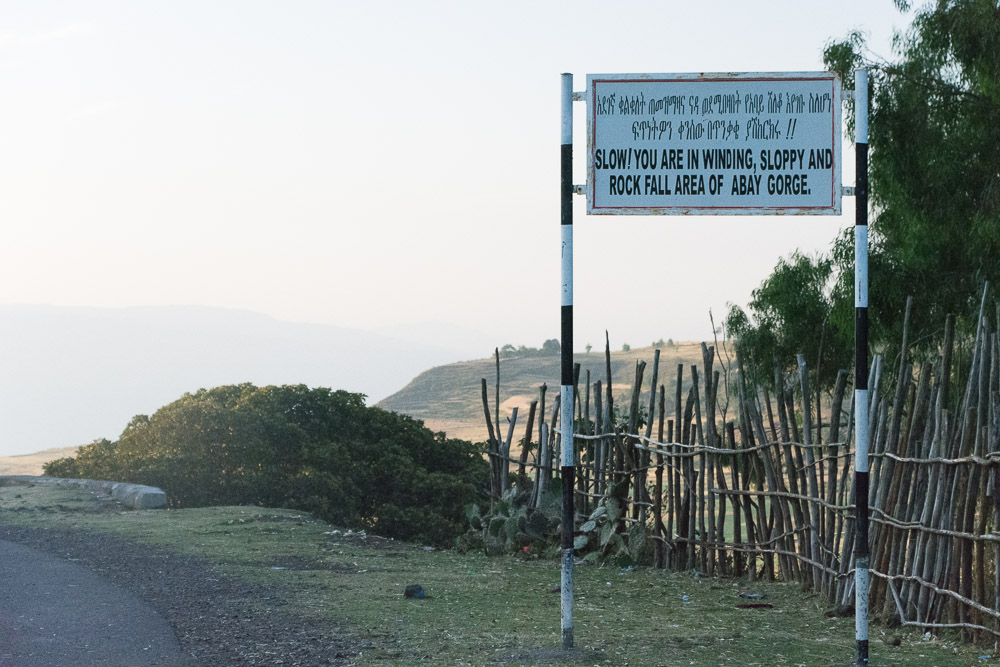
The Blue Nile Gorge is very “sloppy”, apparently.
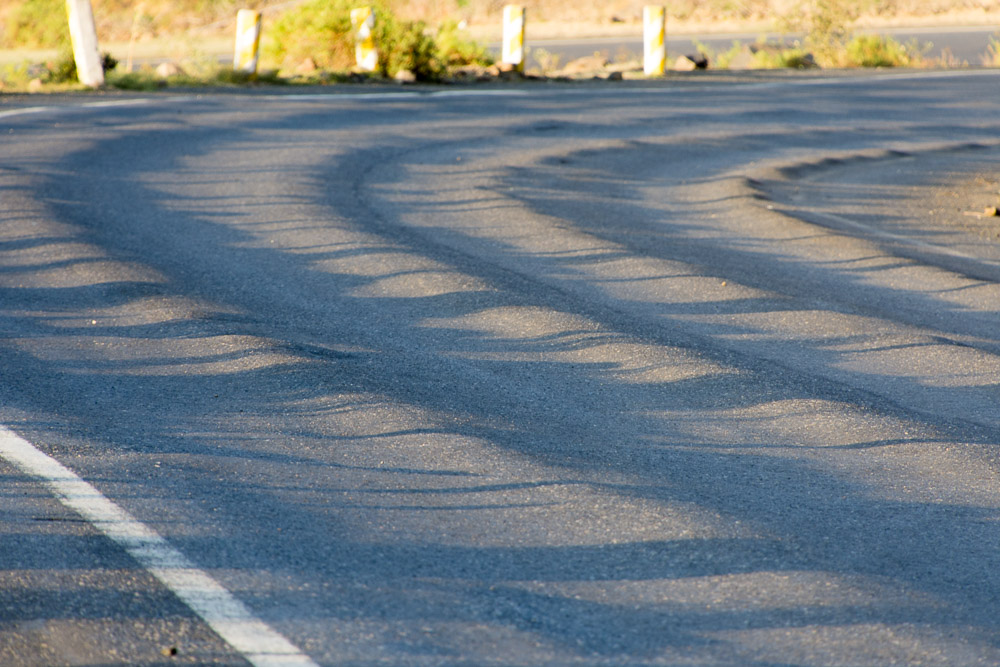
The road down was terrible
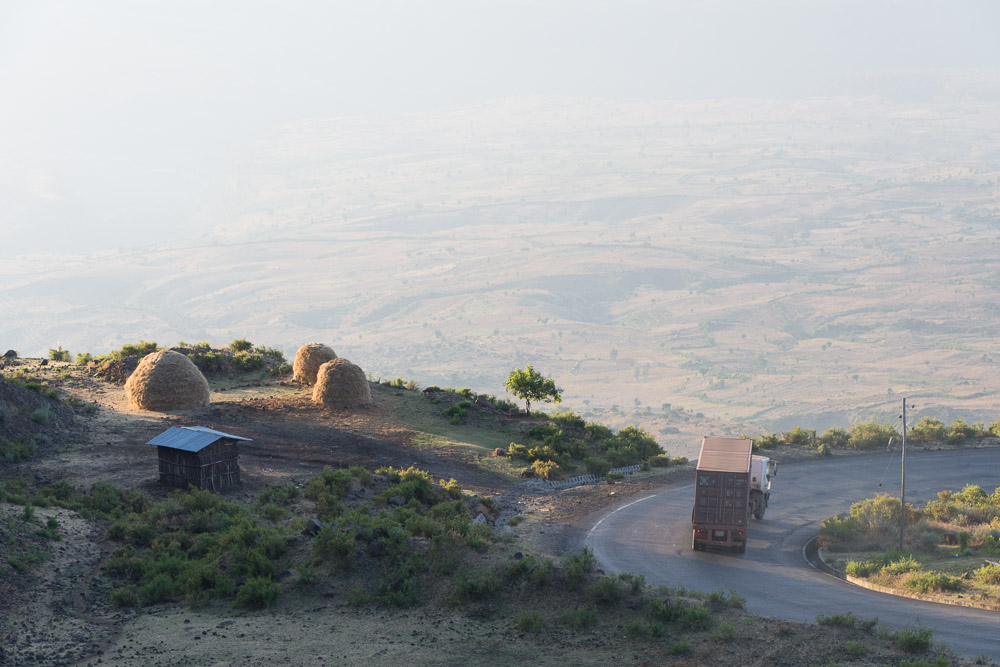
Blue Nile Gorge descent
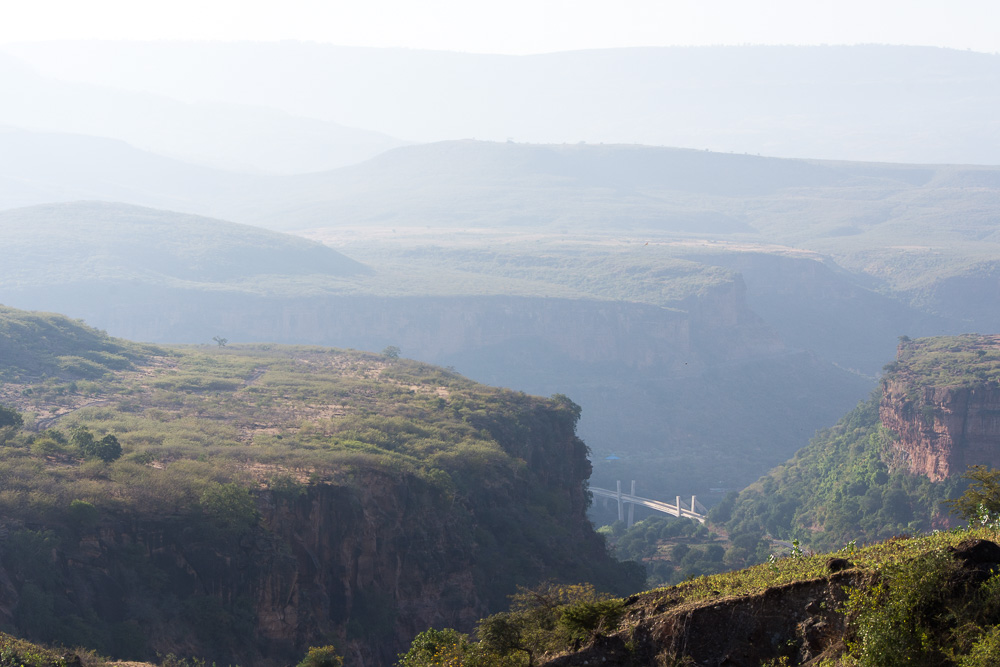
Blue Nile Gorge bridge. Guards prohibit photos any nearer.
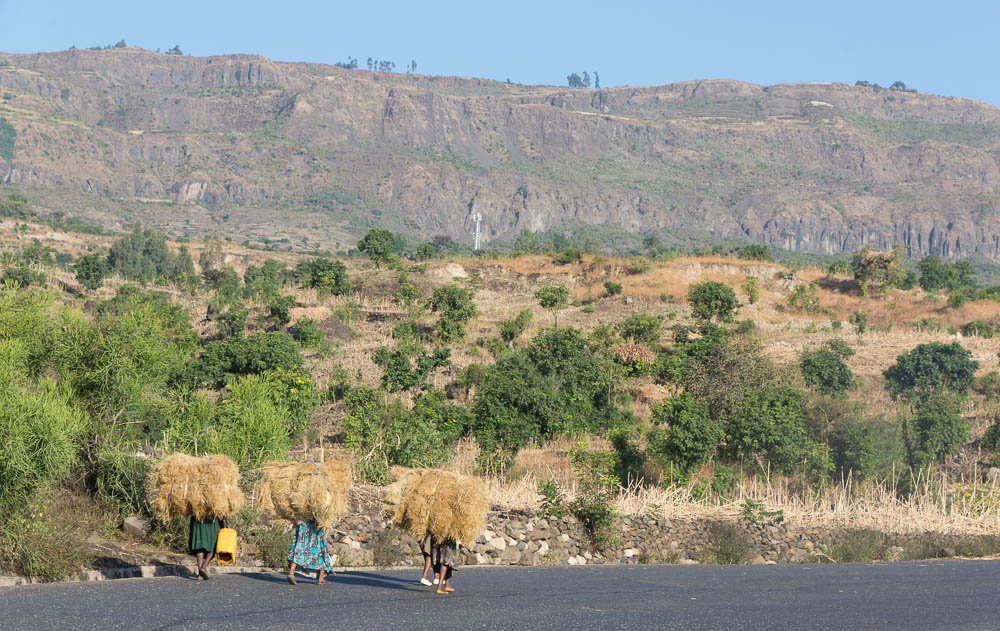
Haystacks being carried up the Blue Nile Gorge
The Blue Nile Gorge world’s second largest canyon and it’s truly breathtaking. But, for us, it was the prospect of the climb out of it that took our breath away.
It’s a 1,360m climb over just 20.05km with an average grade of 6.8%. Several stretches are over 10% and the switchbacks exceed 15%. It took us 5 and a half hours of lung-busting effort to get to the top. Our progress hindered by the altitude, the trucks that belched thick black exhaust into our faces as we struggled up the switchbacks and the countless children that followed with the familiar shouts of “Money! Money, Money!” But, we’re proud to say we made it!
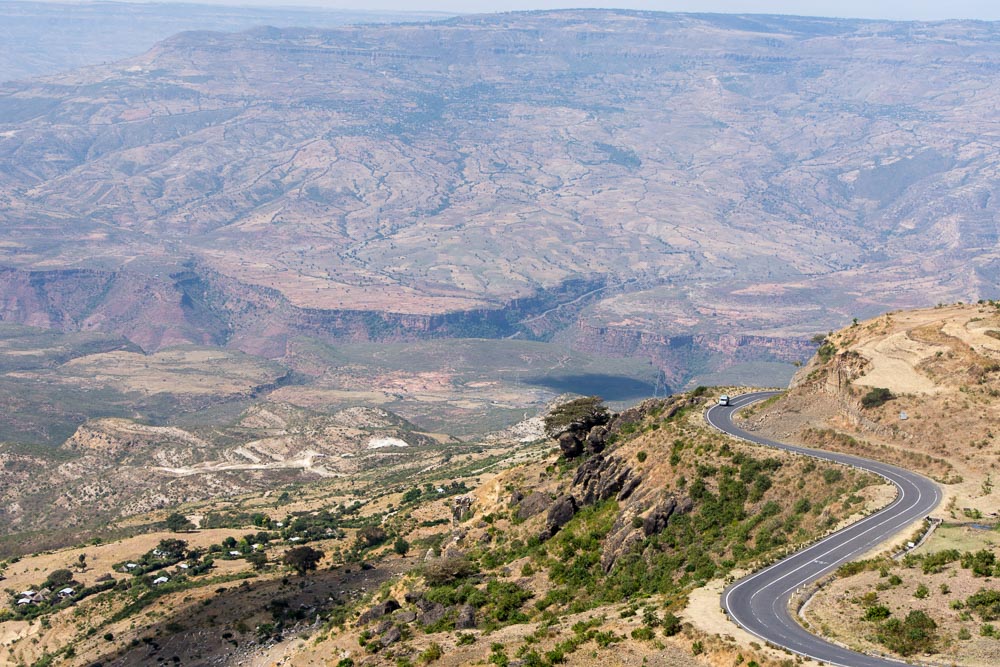
The long, winding and steep road up the Blue Nile Gorge, Ethiopia
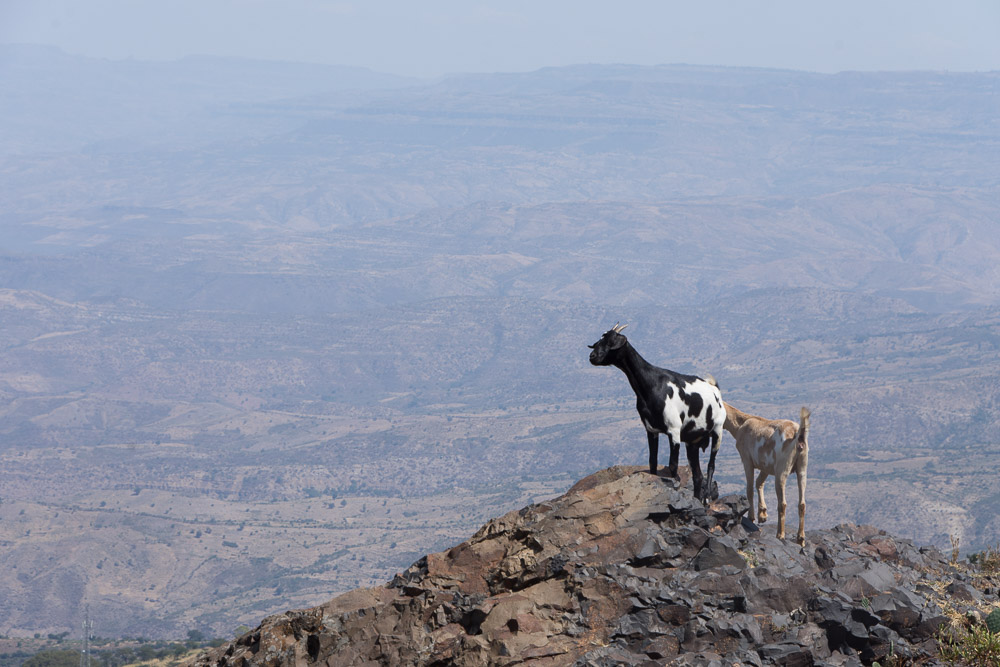
Mountain goats peer into the abyss of the Blue Nile Gorge
Exhausted from the climb, we were descending through the village of Tulu Milki, when, without looking, a woman drove her donkey into the road in front of us. Emily veered left. I had to make the split decision. Do I hit the donkey or do I hit the woman? I knew that injuring or killing a donkey would be expensive (drivers have to compensate animal owners if they kill or injure an animal) so I made the decision to aim for the woman. I veered off the road and down the sloping embankment, taking the woman with me, which propelled me into a wooden roadside shelter where I came to an abrupt stop. I’d knocked the woman’s leg with my front pannier. Apart from shock, she appeared ok. This was until the village surrounded us and talked to her…when, all of a sudden, she started to behave like Ronaldo getting a tap on the ankle. She was dramatically rubbing her leg and wincing. It didn’t take long for the requests of money to come. “You must help this woman” said one man whilst a girl grabbed my arm and shouted for “birr!” I made 100% sure the woman was ok. She didn’t have any cuts or marks so I straightened my handlebars and pushed through the crowd to escape without opening our wallets. The only lasting damage was a wobbly front wheel, which we hoped to fix soon. The donkey was unharmed and took the opportunity to earn a moment’s freedom by running off down the road.
Our traverse of the Ethiopian highlands also took us up to the highest point of the expedition. At 3,115 meters (10,220ft) the air was cold and we battled for breath in the noticeably thinner air.
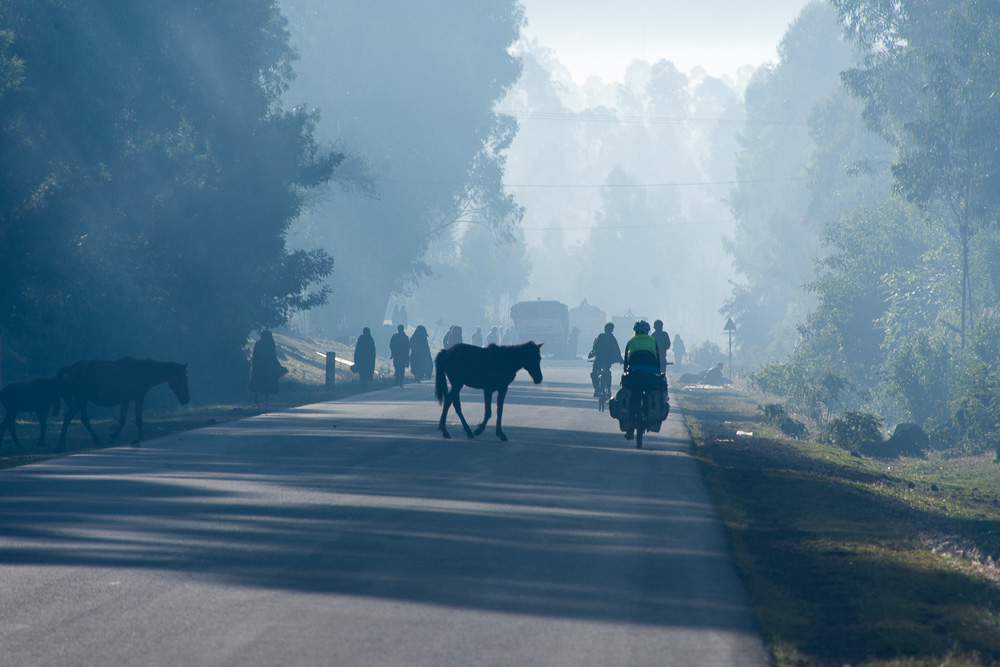
The morning air is filled with smoke from fires in people’s houses.
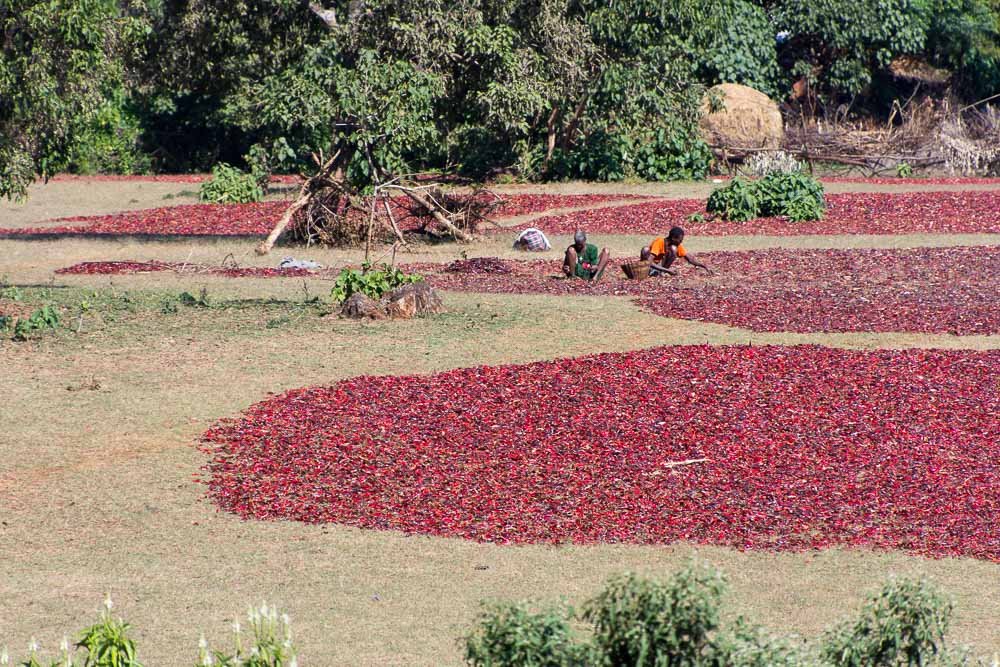
Passing chillis drying in fields
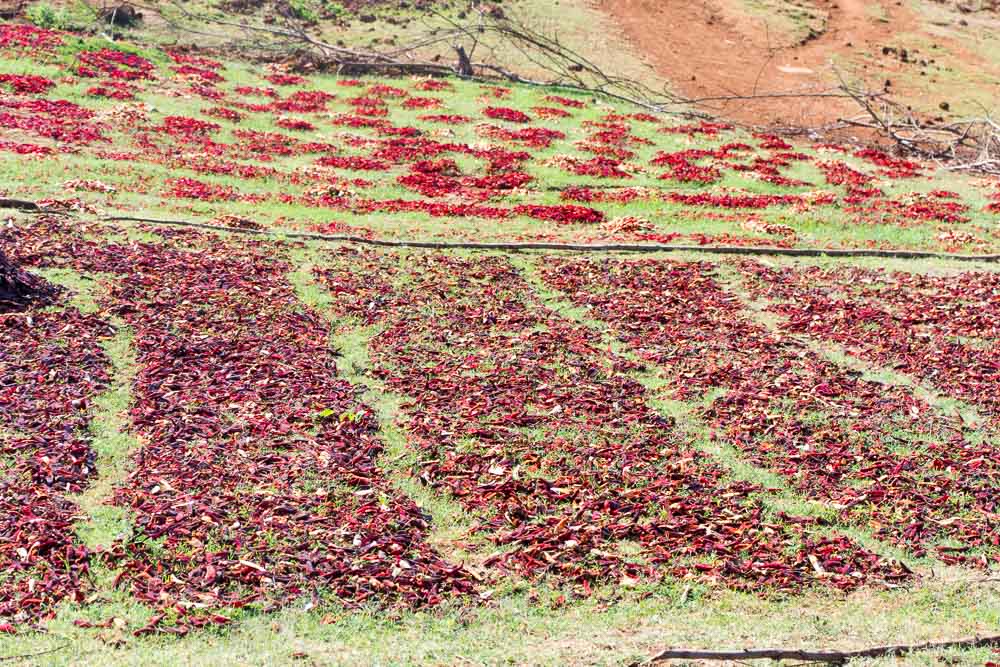
Passing chilli fields
We’d been receiving news that there had been protests across Ethiopia. Some of which were apparently violent demonstrations, which caused casualties and disruptions to roads and traffic. We learnt that the Sudan-Ethiopia border at Metema, which we’d crossed only a couple of weeks ago, had been closed for two days due to clashes.
Of particular concern to us were reports of heavy clashes between protesters and security forces in Sululta, 20km north of Addis Ababa. Heavy gunfire had been heard and the main road blocked – potentially barring our passage to the capital.
As we approached the region, we noticed an increase in police and military presence. Soldiers in full riot gear passed in the back of one truck. Policeman patrolled towns.
We passed through Sululta early one morning and saw evidence that burning barricades had been built across the road but, for us, thankfully we passed through safely without incident.
We learnt that the protests are due to the government’s desire to increase the size of Addis Ababa by building in nearby towns and villages. Something to which locals oppose. From speaking with a few people we have learnt that the government has been in power now for 25 years (unelected) and run a dictatorship internally but gives the external impression that Ethiopia is a thriving democracy.
A travel warning remains for the southwest Oromiya Region where we’ve heard reports that up to 75 protestors have been killed by the government. It’s a region we’ll be cycling close to, but not through.
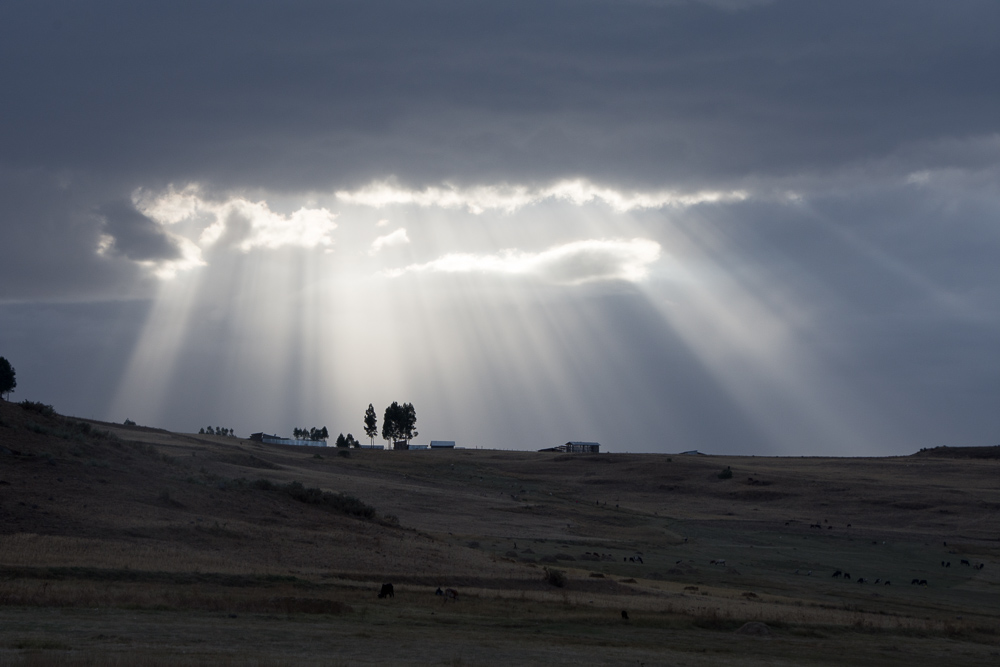
The clouds threatened but we still haven’t cycled in the rain since Romania
In Addis Ababa, we are incredibly fortunate to have been hosted by Celine and Arnaud, teachers at the International School. Although sadly we missed them by two days, they’ve opened their house to us and we’ve spent a couple of days enjoying the use of a washing machine and the luxury of a kitchen. Who would of thought that making spaghetti Bolognese would be so exciting!
We also met up with Miko, a cycling friend of Molla’s, who, with his brother, helped us straighten our wheels after the incident with the donkey. We are incredibly helpful for his help.
Addis Ababa marks the half-way point of our cycle from London to Cape Town. We’ve been on the road just over 5 months and have another 10,000km to go before we reach Cape Town in June 2016.
We’re back on the road tomorrow (23rd December) to make the 800km dash to the border with Kenya at Omorate before our visas expire. We’ll be thinking of and desperately missing friends and family back at home as we cycle south on Christmas day knowing you’ll all be tucking into your turkeys. Please raise a glass to us in the form of a small donation to World Bicycle Relief. Donations are being doubled until the end of December 2015.
Wishing you all a very merry Christmas!

